#I can recommend a few posts with a lot of education material
Explore tagged Tumblr posts
Text
I’ve gotten a few insistent anons lately demanding I state my thoughts and opinions on the current and past history of Palestine on this blog. (You can tell they don’t follow my more personal side blog, I guess.) On the one hand, I do understand people wanting to know that someone they follow has similar opinions on severely important things like this. But on the other hand, most of the asks have that certain… tone that gives me the feeling that they are more interested in ‘catching’ me in something, than any actual concern over my politics or the actual people involved. They’re worded in a way that is very immature—in a way that leaves very little room for anything other than the exact statements parroted back to them that they expect. Which I can’t do. One, because I can’t read their minds to say exactly what they want me to say. Two, because I’m an entire person with a whole life that they know nothing about—something that comes with all the flaws of being a human person with my own history and education based on where I lived and who I knew. And three, because I don’t want to parrot someone else’s words to appease a random person I don’t know. And the thing is, I’ve had this conversation already with nearly everyone in my life. I’ve gone over it at least a dozen times with friends and family from all walks of life. Some conversations were harder than others. All of them were hard. Partially because what is happening is hard to talk about, and partially because I don’t really know what to say. What do I say that changes anything? What do I say that isn’t speaking over someone who is directly affected? What do I say that won’t be misinterpreted by someone willingly misinterpreting/looking for a fight? What can I say that doesn’t hurt anyone at all? Because someone out there will always be hurt, no matter how carefully I try to word things. And I have tried. I’ve written this post 80+ times for months now. I’ve read other’s words and found parts that spoke to me and for me very well, but then have that certain edge that goes into the harm territory. Some lean into Zionism, some lean into antisemitism. Some are just outright racist, some are full on fascist. And that’s really the entirety of it. I just don’t want people to be hurt anymore. So to answer your questions, anon:
I don’t know what the right thing to say is and no matter how careful I am, it will never be correct enough for you. I am angry and horrified at the harm that has been done over many years to the Palestinian people. None of my words can really summarize that history, or what is happening to them right now. Every single day I learn something new, and every single day it is someone doing irreparable harm to innocent people. I am disgusted by the never ending terrorism and harm done by people who think that killing innocents is a worthy way to get them what they want. And that goes for anyone who does this, including but not limited to the Hamas, the Israeli army, or my very own colonizing country. I am alarmed at how black and white people are treating this, and how no consideration is allowed for those who fall between the cracks or who dont follow their strict narrative. That people forget that Jewish Palestinian people exist when they go on their rants, or what people from every ‘side’ or corner of the world can want the end of the harm. That people have hatred for Jewish and Muslim people with no regards to who they actually are and what they believe. That there are so many who support Palestinian freedom, and then parrot outright fascist talking points. That many come to support their Jewish friends, but then say that Palestinian children deserve to die because _____. So, no. There is nothing I can say that really matters. Because no matter what I say someone out there will twist my words, or misunderstand, or tell me that I’m supporting something I don’t support. Because no matter what I say, I just can’t write the right words on fucking Tumblr to stop the harm from being done.
#personal#Batwynn Talks#I don’t know how to be more clear#I struggle to write stuff out like this to begin with#murder and colonialism is bad?#antisemitism is bad?#hatred based on bullshit is bad?#do you actually want to know what I believe or do you want to catch me out and try to make it a Thing#so you feel good about yourself#so you feel like you’ve done something#I don’t know maybe go volunteer or donate to people who need it#instead#trust me#it’s much more helpful than whatever this anon message bs is#anyway#if you feel like you need to learn more about this#just like I did#I can recommend a few posts with a lot of education material#but be prepared#for how truly awful it can be
26 notes
·
View notes
Text
I flunked my math paper again so here's how I think the blue glockers will do in ascending order (no glaze)


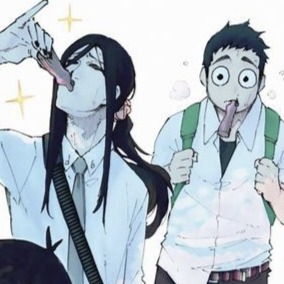
0-49%
Zantetsu Tsurugi 🤓
Sad thing is, he genuinely tried. He really gave it his all, immersing himself in study materials for the past week to ensure he was fully prepared. You could find him studying anywhere—whether in the cafeteria, passing through the halls, or even coming out of the toilet. He went to bed the night before confidently, walked into the exam hall confidently, sat down confidently, and handed in his paper confidently. When he received his paper back, he thought the big fat zero on the front meant he made zero mistakes
Igaguri Gurimu 🤡
Whines about studying, but ends up doing it because his parents forced him to. He grumbles as he picks up his book, pumps himself up for a motivational boost, but gives up after skimming the first page. Has the audacity to complain when he gets a failing grade
Gagamaru Gin 🐨
He lives in the forest, so Goatmaru was probably never exposed to the concept of education
Just kidding, surprisingly he does go to school, but my point still stands
Don Lorenzo 🧟
Sorry, bro grew up on the streets, he never went to school 💀. He picked up some basic numeracy from Snuffy, but that’s about it. Couldn’t care less though—you don't need to know about angles to count your cash, okay?
Raichi Jingo 💥
He forgot there was a test but somehow believes he can wing it. His overconfidence is bound to crash and burn when he gets his results back
Bachira Meguru 🐝
He casually picked up his textbook, flipped through all the pages, and called it a day
Charles Chevalier 😝
If someone doesn't specifically tell him to not study, he won’t even bother. Pretends to look up how to solve equations on YouTube, but he's really just watching Skibidi Toilet
Rin Itoshi ⚽
Surprise surprise, apparently he's only fluent in English and sucks at everything else
Otoya Eita 🥷
He’s got the potential to do well, but he’s too busy having fun with girls. Stealthy enough to copy off someone without the invigilator noticing, but gets caught anyway because he forgot to change up his workings
Kunigami Rensuke 🏋️ (post-wildcard)
He does not care 😭
Nanase Nijiro 😇
He gave his all in hopes of passing, but despite his best efforts, he fell short by a few marks :(
50-69%
Kiyora Jin 🍇🍬
He only puts in the bare minimum effort, so he barely makes the cut. Always hovering on the borderline between success and failure
Sendou Shuto 🩷
Goes like “Heh, I didn’t even study,” but the truth is he crammed everything the night before. Manages to pass though, good for him
Tokimitsu Aoshi 💪
He’s plagued by self-deprecating thoughts before, during, and after the exam. He's slightly more confident since his favorite subject is math, however his low self-esteem causes him to overthink, continuously changing his answers. Even after finishing, he’s constantly rechecking everything to avoid careless mistakes. Overwhelmed by anxiety when he gets his paper back, but lights up when he sees he got a decent grade
Aryu Jyubei ✨
He often stares at his study materials, but rarely does more than that. Instead of panicking about how under prepared he is, he’s too busy stressing over a big fat pimple on his forehead. Still ends up with a C…so not glam
70-79%
Niko Ikki 👀
He’d rather play Yu-Gi-Oh, but knows when to prioritize. He only puts in minimal effort, yet manages to get through because he’s a chad
Kurona Ranze 🦈
He sticks to recommended study methods and puts in the necessary effort, but still struggles with some concepts, resulting in a lower grade
Kunigami Rensuke 🏋️ (pre-wildcard)
He actually studies, even reaching out to others for help when he’s stuck. Unfortunately, he forgot to double-check his work and ended up with a lot of careless mistakes
Shidou Ryusei 😈
Huh? How did he end up here?
Hiori Yo 🎮
He doesn’t invest much time in studying, usually too busy being a #gamer. Despite this, he pays enough attention in class to get a good grade
Chigiri Hyoma 🐆💗
He pays attention in class and only studies to cover what he didn’t understand during lessons. Confident in his abilities, he doesn’t spend much time preparing for exams
80-100%
Oliver Aiku 🐍
Believe it or not, he actively listens in class and is disciplined when an exam is coming up. Very chill during the test, but instead of checking his work, he’s checking out girls
Alexis Ness 🪄
You cannot tell me he’s not a teacher's pet. He pays attention in class, completes his work diligently, and can be found in the library during lunch. He has a very organized study plan, so he avoids careless mistakes
Michael Kaiser 🌹💙
He’s smart enough to decipher complex formulas, dissecting problems before arriving at solutions using his own understanding. He truly is the goat
Yukimiya Kenyu 📸
Quite literally a model student. He’s a bit like Ness, but he also participates in group studies
Barou Shouei 👑
Of course, he gets good grades—he’s the king, after all, and he doesn’t settle for anything less. When asked about his study methods, or if he actually studies, he just tells them to piss off and walks away
Isagi Yoichi 🧩
He actually studies every day for about 30 minutes. He knows the key to math is consistent practice. Politely declines any invitations to hang out until exams are over
Nagi Seishiro 💤
Bro, how? He doesn’t study, sleeps in class, never does his homework. I guess he’s just cool like that
Karasu Tabito 🐦⬛♥️👑
Oh, Karasu, my beautiful, beautiful…
He’s an accomplished, well-rounded student who excels in every subject, including math, thanks to his determination to avoid mediocrity. His motivation and serious approach to his studies fuel his academic success
Sae Itoshi 😐
Unlike his brother, his academic success comes naturally to him—barely puts in work, barely breaks a sweat. I think it runs in the family
Reo Mikage 💳
You'd think he hired professional tutors, but he doesn't — he’s just that amazing
#bllk#blue lock#isagi yoichi#bachira meguru#chigiri hyoma#kunigami rensuke#karasu tabito#otoya eita#yukimiya kenyu#nanase nijiro#hiori yo#gagamaru gin#raichi jingo#alexis ness#don lorenzo#charles chevalier#tsurugi zantetsu#kiyora jin#oliver aiku#sendou shuto#aryu jyubei#tokimitsu aoshi#rin itoshi#sae itoshi#shidou ryusei#kurona ranze#niko ikki#nagi seishiro#reo mikage#barou shouei
239 notes
·
View notes
Text
Toxic Individualism In Modern Witchcraft
The modern witchcraft movement is very much a product of the 20th century, and one thing it picked up from that was a pretty individualist way of thinking. This isn't all bad, since it helped normalize people being allowed to do spirituality in a way that truly resonated with them, rather than following whatever an institution prescribed for them.
But as many of us know, western individualism comes with a lot of really toxic shit, encouraging and even enshrining apathy, cruelty, and social Darwinism. This, unfortunately, is very much an attitude you occasionally see within modern witchcraft.
This is sometimes expressed through a "let 'em sink or swim" attitude. For example, you might see people bristle at the idea of warning people about dangers such as toxic plants; "well, they should know to just research this themselves, if they get hurt, that's their own faults." Never mind that most of us live in a socioeconomic environment where "natural" tends to be equated with "safe," and few people were taught any real amount of research skills. (Most people don't know how to research beyond "type a thing into Google and click the first link" or "watch a video on YouTube and follow the algorithm.")
There's this sort of idea that witchcraft and the occult is this kind of Darwinian proving ground. You're either just born having what it takes, or you're not. Supposedly, there's no need to warn people about red flags, fascist rhetoric, pseudohistory, or anything, because supposedly, the "worthy" will just be able to find their own way on their own. Anyone who doesn't make it? Anyone who ends up poisoning themselves or falling down the alt right pipeline or abused by a predator? Couldn't be helped; they were never "meant" for this path anyway. It was simply too much for them. Why, if you really think about it, it was their own faults for daring to reach above the station they were born for, anyway.
This is a completely irrational view, because it's simply not how things work. People aren't born having research skills, critical thinking skills, or knowing the difference between real history and pseudohistory; they're taught these things. And some people are statistically much less likely to receive a good education than others. There are a few people who beat the odds and end up better educated than most people in their socioeconomic status, but this doesn't mean that they were born with inherent greatness; it just means that they were curious and lucked out in finding the right materials.
As many of us also know, Victorian-era eugenicists believed that members of the upper class were just inherently better. They had the genes for intelligence and strength of will. (Yeah, that whole modern occult fixation with willpower has some dodgy origins, too.) They just ignored that whole thing where they lived in a socioeconomic system designed to keep most people in poverty. If they ever saw someone beat the system, they attributed it to that person being born exceptional for some reason. I would highly recommend that anyone who hasn't done so already watch Shaun's video, The Bell Curve, which criticizes the book by the same title that effectively tries to argue for Victorian-age eugenics, to get a better picture of this whole thing.
Toxic individualism also encourages thinking of individuals as main characters on some kind of hero's journey, where every pain they suffer and every mistake they make is a vitally important part of their journey and growth; so much so that any effort to prevent them from making mistakes or suffering harm is hindering their personal growth.
Sure, people do often gain valuable insight from their mistakes and suffering. But it's absurd to claim that this is always the best way for people to learn and grow, especially if there's a risk of serious harm for themselves or others. Certainly it's much better to learn from a friendly Tumblr post that essential oils can give you chemical burns or harm your pets than experience it first-hand. And it's much better to learn what far right rhetoric looks like beforehand so you can recognize it when you first see it, rather than get drawn into some far right belief system and perpetuate harm on vulnerable minorities for any amount of time. (This whole thing of acting like you're life's main character and other people are basically just NPCs on some hero's journey that you imagine yourself to be on is so immensely fucked up.)
And finally, if anybody out here finds themselves thinking, "but nobody should expect help from others; after all, I didn't get any!", I'm gonna tell you: it shouldn't have been that way. You didn't not get help because that's just how the world works; you didn't get help because that's how modern western socioeconomics are created to work. Toxic individualism is a construct, and it's one that we can dismantle and replace with something better.
#witchcraft#eugenics#social darwinism#spiritual eugenics#spiritual darwinism#victim blaming#individualism#toxic individualism#anti communal behavior
168 notes
·
View notes
Note
Hello! I was wondering if you had any resources for reading about or writing systems?
A few of your posts have really inspired me and I wanna make sure whatever I put out as more "serious" work is a better representation than just "what this one headmate thinks plurality might be like", especially for other system types/origins!
Thanks :3
Hm... Well, I can't recommend @writing-plurals enough for advice, honestly! As for my own advice, here's three posts where I've given advice before:
Post 1 (general tips for writing plural characters)
Post 2 (general tips for writing plurality)
Post 3 (avoiding stereotypes and challenging the fears that come with creating representation)
I think the best thing to do in order to get to know a certain group better is just to talk to people of that group (or at least, read their posts and works about what their lives are like). Especially since no two lives will be exactly alike; the more people you talk and listen to, the more patterns you'll be able to notice, and the more material you'll have to use as inspiration (which is especially useful, since you never know what will or will not work for your story until you actually sit down to write it). Plus, most folks are happy to answer questions about their system and how it works! Or at the very least, most will correct common generalizations they've seen that don't actually apply to all systems. It's better to ask and risk getting rejected than not give yourself a chance to get any input at all, in my opinion.
On that note, it's alright to write things clumsily, so long as they're genuine. Plurality can be difficult to portray all the nuances and details of, as I've found through my own experience. It's alright if your work sounds clumsy or cheesy at some points – trying to talk about one's identity and personal experiences often is. As annoying as it is, such personal topics just aren't always going to translate perfectly into seamless prose, especially if you're trying to introduce the audience to new information about something that occurs in the real world. Finding that balance between informative "nonfiction" and the plot and flow of a fiction story is difficult (I think that's why a lot of language education videos have just fully embraced that awkward in-between and refuse to apologize for it, and honestly, all power to 'em for that, at least they've found a way to own it). Don't give up on a scene or idea just because it sounds clumsy, especially if it's your first few drafts. Sometimes, clumsy writing is the only way through the muck of it all (even if only on your first few attempts).
If you need references or examples, we have a lot of works on this blog under the pluralprose tag, or you could go to Ao3 and search under the Multiplicity/Plurality tag (they have longer works there than we get, so I definitely recommend it if you want an example of how a longer story could work). Reading – and giving yourself time to analyze what you're reading (what you like, how the author does something, any stylistic choices you might want to implement into your own work, etc.) – is important as a writer, after all! Especially here, where those works can double as resources for understanding other systems and how they might like to be written about.
I hope this helps!!
#not a prompt#asks#the link may be a little finicky on m.obile and not show you all our posts tagged with that. just a heads up!#pluralprose
8 notes
·
View notes
Note
Hewo is just that i don't know else to ask this but since i liked your subs for a long time i wanted to see if you can help me ૮ >⸝⸝⸝⸝< ა
I want to make subs but like ug ug! But i am worried about a few things..
[1] how do i make sure my channel does not get banned? I know that there is always the risk but how to increase the odds?
[2] how do i make sure my subs reach the ug community or the community i want? I am terrified of surfies somehow finding my channel and doing terrible things to it (ㅠ﹏ㅠ)
hi hi!! sure i'll try to help ^_^!!
1: link to a password protected padlet with benefits in the comments rather than in description and put a link to the benefits (with the title of the video) on rentry/notion/not google docs in the padlet. put a disclaimer like this:
Disclaimer: This video is not a substitute for professional medical treatment and does not guarantee results, as individual experiences may vary. It does not endorse any harmful behaviors. For specific health concerns, please consult a qualified professional. This content is intended for entertainment and educational purposes only. Credit for images, sounds, music, and other materials goes to their respective owners.
also i think maybe presenting it like an edit/lyric video might be helpful (like saying song is this, this is an edit for blahblahblah, this is a lyrics video for blahblahblah)
2: join my server /hj. i think most ug servers are dead. but i think posting in those is good. also add tags in the description like : ug subliminal, ug sub, ugsc, ug subliminal community, etc. u could also try to see if any bigger ug creators want to collab, we could collab if u want as well ! !
i hope that helps... i honestly am not too sure how to manage both getting people to find your video and not getting Attacked by youtube myself but this is what i think is best T_T i wouldn't recommend doing topic specific tags in the description because it'll make it easier for surfies to find your stuff... just try to find people in the ug community and get followers through word of mouth i think. uhh hope that makes sense. i'm trying to work on getting a subliminal sharing website out that's better than youtube in A lot of ways (at least for subliminals) asap.i think it'll be easier to find ug subs on there too. (it'll have a tagging system like ao3 or tumblr). so look forward to that :3 (please. i need to get people to use it LOL)
5 notes
·
View notes
Text
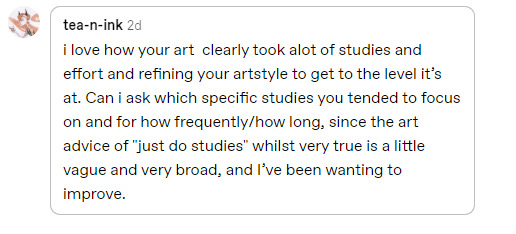
Hi there @tea-n-ink !
Figured it'd be easier to try and answer this as a post rather than in comments. I'll try to answer the best I can but in all honesty I'm not entirely sure how to answer this question in a way that will be satisfying or insightful. Because while I have an education in visual media and work in the field (which contributes to the studying and progress), a lot of my personal work has been (for lack of a better way to phrase it) "fucking around and finding out" for better AND for worse. A lot of how I work is both in contrast to what's required of me of my job but also based on habits built to perform that job. So I'm not confident in how much I could recommend approaching art the way I do or how applicable it will be. I can only speak to my own experience. Everyone will want to achieve and pursue different things with their art so I don't think there's going to be a specific answer of exactly what to do. I think I can only recommend some amount of framework to consider at best? I'm also not a good writer and struggle to articulate specifics especially when it comes to my creative process because it's very uh…. soupy? unstructured? But I want to make an attempt! I'm so sorry if this ends up being a rambling mess.
I haven't done studies/ brushing up on basics for a few years and I'm actively feeling the limits of how I draw because of that. So I absolutely would recommend brushing up on the fundamentals and doing studies every now and then to help prevent that kind of rut. I feel like it's something to do relatively consistently? It's like stretching and exercising a muscle to keep it in shape. However, how much and how frequent a person does that is going to be up to them based on what their lifestyle is and I feel this is more of something to consider to do long term over time rather than in short term bursts. But if you have the time to do a lot in the short term and won't impede life responsibilities then that's great! Just remember to take breaks because sometimes what you've learned and observed needs time to sink in. But also to protect your hands and physical health.
As for the "just do studies" / what studies to do, I guess a bit of a combination answer incoming? Because of the nature of my job (what is asked of me and MIGHT be asked of me), doing studies is going to be of the vague/broad variety because of how much possible ground I might need to cover. So I've done studies, sketches, looked at reference material etc. of a bunch of different things for years. A majority was outside of my comfort zone and I think it's important to try to to challenge yourself in such a way every once in a while. And definitely trying to explore many different topics (people, plants, architecture, animals, etc) will give more knowledge and possibilities of things to draw. However, it's also not very realistic to expect anyone to study everything to its minutia. I sure can't! I can try my best to draw some basic structures but I don't have enough knowledge and practice to make a convincing cityscape. And even with all the dabbling in different topics I've had to do, I still focus in more on the most likely things that's required of me or what I personally enjoy to draw on my free time. That tends to be characters. So when I do need to brush up I lean towards anatomy, musculature, human observation, that sort of thing. And I feel regardless of what anyone's style is, If you want to draw figures of any sort, practicing and revisiting that is always helpful! Also doing studies of specific things you want to improve on or things you are aware are your weakness is also an avenue I recommend. I think the last studies I did was of hands because it was something I wanted to improve on at the time. And I think it's high time I give buildings another shot.
As for style it wasn't something I actively worked on or envisioned. Rather, it was the inevitable mishmash of the aesthetic choices I liked in the artwork I enjoyed, habits I formed and not wanting to draw how I needed to during work hours. And this was a slow and gradual process over my whole life so far and it'll keep on going as long as I continue doing art. And I wouldn't consider it a linear progression either as there were many points where I backpedaled on certain choices because I didn't want to do things like that anymore and went another direction. As for how to develop and refine this actively, I can't say for sure. But what I can say is a person's style will be a love letter to the things they enjoy. Inevitably you'll be influenced by the things that speak to you and you might not realize it until years down the line. In my case, Jet Set Radio was something I played as a kid and it deeply impacted how I drew and what art I gravitated to for years before I realized how formative it was. The more you consume what you enjoy, the more it'll show in your art whether consciously or not. I suppose a potential exercise that can be done is maybe looking at several pieces of art you enjoy and trying to figure out exactly what it is about them that you like? Especially if maybe you find a common element to their styles that really speaks to you that you'd like to incorporate into your own art? While I can't say how effective this'll actually be, if I were to say, "Jet Set Radio, The World Ends With You and Dogs: Bullets & Carnage are things that had a lasting impression on me," and then you were to look at my art I think that statement would track.
But I also want to note that when I create I'M ACTUALLY VERY UNSURE OF MYSELF. I REALLY DON'T KNOW WHAT IM DOING WITH COLOURS AND I'M CONSTANTLY JUST HOPING FOR THE BEST EVERY TIME EVEN THOUGH I DID GO TO SCHOOL FOR WHAT I DO AND I SURE DO WORK HERE NOW. I rely a lot on my gut for things and end up trying over and over, sometimes fully scrapping and then unscrapping before my art gets to whatever I post online. And many things just never end up online. Sometimes things don't work out, and that's ok. And sometimes it feels like things won't work out but then they do. So don't feel discouraged when things don't work out the way you planned. I've found for myself, having a plan in my head of how i want to progress would just contribute to my already abundant anxieties so just letting things happen as they do was really helpful (outside of actual critical deadlines and professional responsibilities). There's always chances to try again and sometimes all you need is a break and to come back to what you were working on with fresh eyes.
I dunno how well this answers your question but I hope you were able to find something helpful amongst my brain soup.
13 notes
·
View notes
Note
hey blue, i saw your post on writing characters experiencing seizures and epilepsy. my biological mother has been an epileptic since childhood and has had many seizures, as well as strokes and bells palsy, but is severely mentally ill in a way that prevents them from pursuing treatment as an autonomous adult. however, my family is highly neglectful and i've had to take my healthcare into my own hands my entire life, and have seen over ten neurologists who claim i'm either perfectly healthy and faking my non-neurologic conditions/psychosomatising myself into being sick due to my family history of complex illness, or claim i am UNhealthy but require a "more specialised neurologist." no one has been able to refer me to one of these, including neurologists who ARE specialised, work at seizure/epilepsy clinics, or coordinate with neurosurgeons.
i think i have absence seizures. no one has done any testing beyond brain MRI, eeg, and [brain fog, blanking on the name] the test where they stick conductive needles into every body part they can [SIX separate times thus far. it always comes back normal.] i feel stuck staring into space sometimes and can slowly move my head but not my eyes. i can't normally talk like this i think? other times i feel my eyes glaze over, my eyelids start twitching, and sometimes i have twitching in other parts of my face. this happens the most when i'm sitting upright [something i have trouble doing] and am having an animated conversation. everything begins to feel like i'm swimming and fogs over, but i can still talk fairly normally and no one has ever noticed/pointed these episodes out. i think i become less animated and maybe slower when these happen, and may struggle to find and express complex words or thoughs, but i have ADHD with cognitive disengagement syndrome so everyone is used to me being slow. they last from a few seconds to two or so minutes, and can happen once during a conversation or ebb and flow numerous times. i have tiny spasms in various parts of my body seemingly randomly that you can feel if you touch it, but are rarely visible - the most visible instance was when my ankle was quite literally vibrating.
i have treatment resistant JRA that inflames EVERYTHING, including my internal organs and likely my brain to very small degrees. i also have three [countable] schmorl's nodes gthat just. appeared? they aren't the result of an injury or strain as i can't do anything strenuous, but simply Existing puts my body under such duress they occured. i also have an "abnormal" intraosseous hemangioma in my t4 that has only gotten worse, my legs may as well disappear when i sneeze a specific way, i have vestibular issues and neuropathy... a lot of neurologic symptoms that add up to even my manhattan, NYC neurologists asking if i've tried to go to the mayo clinic. i DON'T feel undiagnosable, though. i'd really like if you could respond with any resources you would trust for seizure education, specifically absence seizures. i have another neurology appointment in september at yet another seizure clinic and will continue trying to pursue treatment, and in no way am i seeking medical advice from you nor misconstruing you as a source of medical guidance. your post reads as if you have personal experience with/researching epilepsy and seizures, and i'm reaching out in the hope you have further reading material to recommend that you trust. i've read all the webMD pages and things like that, but i just can't find sources discussing practically invisible seizures seemingly triggered by lively conversations. i don't know if maybe my own body language triggers these episodes or not, for example, but your post was the first time i read something state a trigger could be something other than flashing lights. [mandatory disclaimer over]
sorry for the long ask! thanks for your time and your very cool resource. writing disabled characters well requires both the logic and emotion of the experience of being disabled, and including aspects such as embarrassment and guilt over symptoms [ex. loss of bowels and bladder control during a seizure] not as a means of humiliation, but to remind writers and readers that our relationships with our bodies are complex, personal, and varied is so important. it's easy to reduce us to clinical shortlists of symptoms, visual descriptions, and needs, but disabled people are so much more than that. thanks again
Hi!
First of all, I'm glad that my post resonated with you. I absolutely agree with what you say about writing disabled characters - its complex, multifaceted, and deserves to be done with attention and care.
Thank you for talking about your story and your symptoms. I'm glad you felt safe sharing! As you mention in your post, I am not able to offer any kind of medical advice. The writing advice in my post is gathered from internet research (which I am sure you have had to do far too much of) and experience working with people who have epilepsy. That, for instance, is where I first learned that a seizure can be triggered by much more than just flashing lights.
To be honest, the only specific resources I used to write that post are listed at the end of it - a podcast episode from This Podcast Will Kill You and a book called The Spirit Catches You and You Fall Down were particularly informative. The rest was Internet research and personal experience. I've worked with about a dozen people with different kinds of epilepsy, with varying degrees of closeness and for varying amounts of time. Some I still speak with, and this is where my more nuanced information comes from. Online communities of people with epilepsy may be able to provide this kind of information, although I have to say as a non-epileptic person, I don't have personal knowledge of what those communities are like.
I spent a long time thinking about this ask. I want to have better answers for you, and I want you to get the help you're looking for. I thought about digging up some online resources that looked good - but you've probably spent much longer doing that yourself, and I don't think I'd be able to find anything that you couldn't. The only real piece of information that I have is that I know people that have done EEGs (I think that's the form of brainwave testing you're referring to) that have lasted 3 days, and still haven't picked up a seizure or seizure-like activity. This is frustrating and painful, but it doesn't mean their (or your!) symptoms aren't real.
Your symptoms are real. Your frustration and suffering are real, and I am so sorry that a diagnosis and treatment haven't come yet. I'm also sorry you're going at it alone. You write about yourself, your symptoms, and your needs with awareness and clarity, which is an extremely powerful thing. I hope that the new neurology center has better answers for you.
Please feel free to come back anytime - I know this isn't what you were looking for, and I am truly sorry for that. I wish you well!
1 note
·
View note
Text
Couple of thoughts on the changing social media landscape etc...
This blog is, and always has been, a public/mostly professional space. The nature of Tumblr means I can have sideblogs for personal venting and off-topic posts, as many of them as I want, and this blog is fairly carefully curated to be a public-facing page. My mum looks at it sometimes, after all, so anything I post has to be something I'm willing for her to see.
(Note: I think sideblogs and stuff are very important. Everybody needs a space on the internet where they're not being observed by colleagues, supervisors, managers, readers, anyone to whom they owe professional responsibility. A place to be Weird and know that it's not going to impact on their job the next day. If you don't yet have those spaces and you're someone who uses the internet in a professional capacity, I recommend creating them; it's freeing. If you think you've found somebody else's sideblog and they haven't indicated that they want to share it with you, it's polite to pretend you don't know and let them have their Weird Place Space in peace.)
This is a LESS professional space than, say, my website, and I have different rules for myself than I did on other social media. My Twitter policy has long been not to swear on there, and to keep my account reasonably suitable to be read by teenage readers, current/future employers, and other authors alike. Here, I tend to keep my own swearing to a minimum but I'm more relaxed about sharing others' sweary content, and I'll reblog slightly more risqué things (usually relating to the vampire novel).
I've been happy with that balance. It's a place people can follow me as an author, as an academic, and as a person, and get a reasonable mix of my research, my thoughts, and updates on my books, without being unduly formal and without me ever feeling like I couldn't be myself here. And it's a place where I both create my own material and share that of others, tending towards sharing things that are educational or that relate to my own work, but also just vibing.
I've always known, though, that this was not a space for publicity per se. While I do share links to my books here and I know that a few people have bought TBA, I've never been under any illusions about the possibility of Tumblr as a place to advertise myself. Nor do I WANT to do that. Honestly, I've come to resent the pressure to use Twitter as a "brand", as a "promotion" opportunity, when for years it was just a place I hung out as a person. But I'd rather do that there than here, partly because it actually worked there.
If this truly is the decline of Twitter, I don't mind my online socialising becoming more Tumblr-focused. I'm sad about the loss, because I think I'll lose a lot of academic community and opportunities to learn that I previously found on Tumblr, and it's going to be a lot harder to connect with other authors, but it won't be impossible; I have both academic and author friends here. But what I DON'T want is for Tumblr to have to become my Professional Space to the detriment of the fun, low-key vibe I've had going here for the last 11 years.
I'm worried that, if all of my professional contacts migrate here, I will have to start putting a mask on here as well, and I'll feel more pressure to self promote. It'll start to feel like the chore that other social media has become ever since I got published and have had to start using the internet As An Author and not just as a person who also writes books. I am very happy for more people to join this site, but I don't want the side effect of that to be that suddenly all my colleagues are here and I'm in Work Mode all the time.
One of the things I've found hardest about the internet in recent years is the switch from what it was in my teens (place to be weird and unique and unselfconscious) to what it is now (place where I'm expected to be professional and might be observed by my boss, academic colleagues, publisher, readers etc at any time). And Tumblr was for a long time the last bastion against that, even if my mum looks at it. I'll be sad if that goes, because all the sideblogs in the world won't help if actually being here starts to feel like something I do for work.
Crucially, I think the problem is that for career reasons, I need something that does for me what Twitter was doing, but also I was not enjoying that aspect of Twitter and it was not feeling like a fun place to do that, so what I REALLY need is for my career not to rely on me managing to virtually hand-sell my book to people on the internet while I'm just trying to live my life...
Anyway. Just something I'm thinking about as I face down the possibility of this being the main place where I as an author can communicate with potential readers. I don't really want it to be... that, but it might have to be that, and I'm going to be thinking hard about how I navigate that.
12 notes
·
View notes
Text
Timeline: Batman
google doc / ao3
This is my best attempt at a post-crisis timeline based on age-- specifically Bruce’s age every time he adopted and/or met one of his children.
List of events:
Bruce’s parents die
Bruce becomes Batman
Dick’s parents die
Dick becomes Robin
Jason becomes Robin and is adopted
Jason dies
Tim becomes Robin
Cass appears
Dick is adopted
Tim is adopted
Cass is adopted
Damian becomes Robin
I’ll be citing my work by issue and panel. This isn’t my most organized work, and I don’t know how well tumblr will let me translate it, so I do recommend the google doc. I imagine the image quality here won’t be great.
Notes:
This is a post-crisis timeline (1986-2011). I’ll be referencing a few pre-crisis panels, but I won’t be touching the New 52 or anything after it. That’s a different game of ball with its own, extremely bad, timeline.
Crisis on Infinite Earths is a 1985-1986 series that rebooted the DC timeline and altered some backstories, including Jason’s. Pre-crisis, his backstory was almost identical to Dick’s. Post-crisis, he changed to the “steal the wheels off the Batmobile” origin. Anything written before 1986 is a weak source for my purposes.
My original question centered around Bruce’s age through the process of meeting and acquiring his children. In this timeline, those children are (1) Dick Grayson, (2) Jason Todd, (3) Cassandra Cain, (4) Tim Drake, and (5) Damian Wayne. I was envisioning an interview where the kids explain their family timeline to outsiders. I did not anticipate the project taking this long.
We’re talking about 72 years of content here, which means decades of contradiction, conflation, and rewrites. I’m pretty satisfied with my work product, but please understand that there are no perfect answers. I’m going to cite my sources, and I’ll do my best to explain why I chose those sources specifically, but it’s pretty likely that for every panel I pull, there will be others with different numbers. We’re all going to have to live with that.
Event timeline
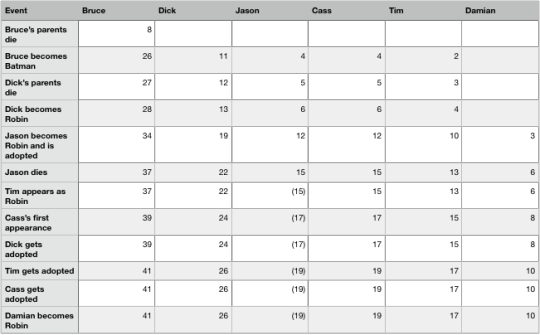
*I’m defining Jason’s age by the time elapsed since his birth, but you could make an argument for using time he has been alive, which is, of course, different. That’s why the parentheses are there.
Age differences

As Robin

----------
Bruce’s parents die
Pretty consistently, Bruce is written as eight years old the night his parents died.
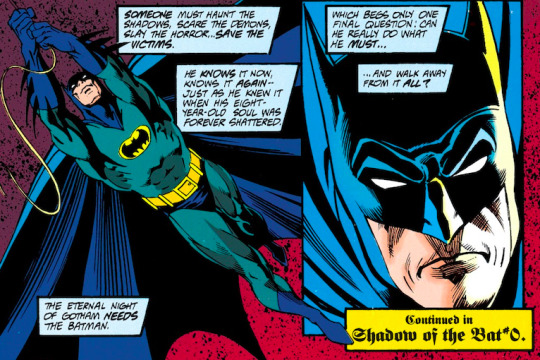
Detective Comics #0 (1994)
This is a zero issue where Bruce thinks back on his origin story. It was written long after Crisis on Infinite Earths (1986), and I tend to give a lot of weight to ages written in summaries of past plot lines, my reasoning being that it’s easier to be consistent in one issue than it is to be consistent through a month to month story.
Bruce first appeared as an adult in Detective Comics #27 (1939), and the Waynes were already dead at that point, so flashbacks are the only available material anyway.
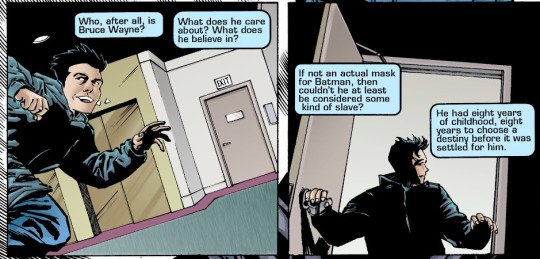
Gotham Knights #6 (2000)
The text is Hugo Strange talking about Bruce, and the image is Tim and Dick playing at Wayne Enterprises.
I’ll take a second here to note that I did find at least one alternate age for Bruce— in Superman/Batman Secret Files & Origins (2003), Bruce was 10 when his parents died. I’m disregarding that in favor of the stronger 8 year old timeline, especially in light of Batman #404 (1987).
Batman #404 is the beginning of Batman: Year One, which was explicitly written to clarify the Batman timeline post-crisis, and it’s the basis of most of my calculations for Bruce and Dick’s ages.
----------
Bruce becomes Batman
According to Year One, Bruce was 26 years old when he became Batman. I’m using his age at his parents’ deaths, his age when he returned to Gotham, and his 18 year timeline.
Batman #404 puts Bruce at age 25 when he returned to Gotham in January.
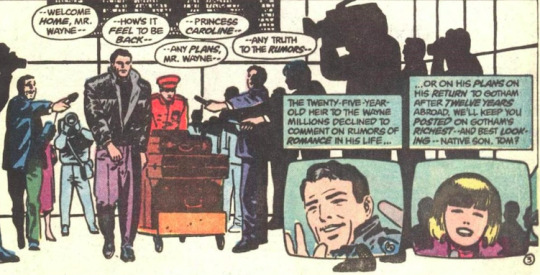
Batman #404 (1987)
Bruce gives his dramatic, “Yes, Father, I will become a bat,” line in March. In the same scene, he says that it has been 18 years since his parents’ deaths. Knowing that they died when Bruce was eight, that puts Bruce at 26 years old the day he became Batman, which makes sense considering Bruce’s birthday is usually set at February 19th.
He was 25 in January, turned 26 in February, and became Batman at 26, 18 years after his parents’ death.
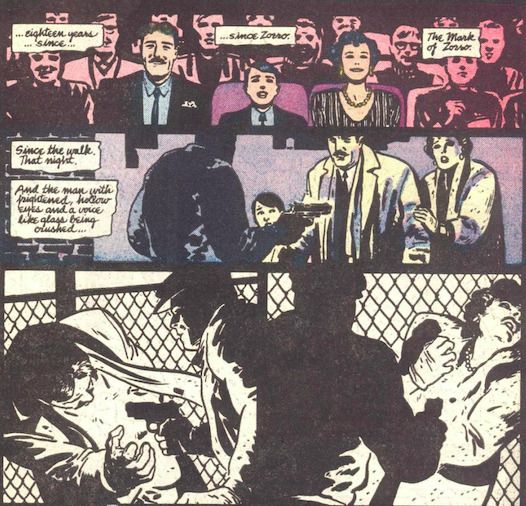
Batman #404 (1987)
Post-crisis, DC built timelines off the “Year” model. Year One is Batman’s beginning, and events after that are measured by how far away they are from the year Bruce became Batman. I’ll be using the Year model for Dick’s life events next.
----------
Dick’s parents die
The Graysons died in Year Two. Using the Year Model, Dick was 12 when his parents died, and Bruce was 37.
Year timelines appear a fair amount, especially in issues titled “Secret Files & Origins.” I pulled this bit from Batman Secret Files & Origins (1997) because it was the easiest to screenshot.
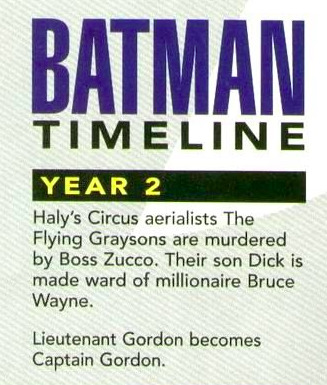
Batman Secret Files & Origins (1997)
Year Two would place Bruce at 27 years old. I’m calculating Dick’s age backwards, based on him being 13 years old during Year Three.
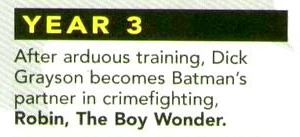
Batman Secret Files & Origins (1997)
----------
Dick becomes Robin
Dick became Robin in Year Three, when he was 13 years old and Bruce was 28. I’m using two different issues to calculate the number.
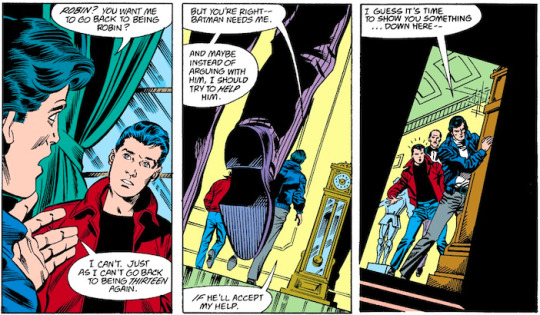
Batman #441 (1989)
Batman #441 is from Tim’s introduction story. It takes place “months” after Jason’s death. We’ll get to that part. In Batman #441, Tim asked Dick to be Robin again in order to help Bruce, who was visibly unstable after Jason’s death. Dick says that he can’t go back to being Robin, just like he can’t go back to being 13 years old. The strong implication there is that Dick became Robin at 13, which corresponds to Dick’s statements in Batman #416 (1988).
In Batman #416, Dick as Nightwing returns to confront Bruce about Jason becoming Robin. He says that he was Robin for six years, and he stopped being Robin at 19.
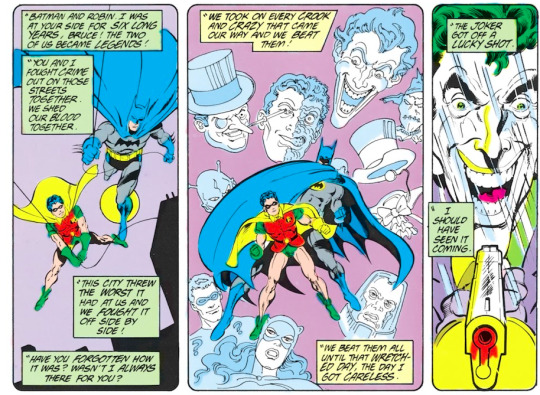
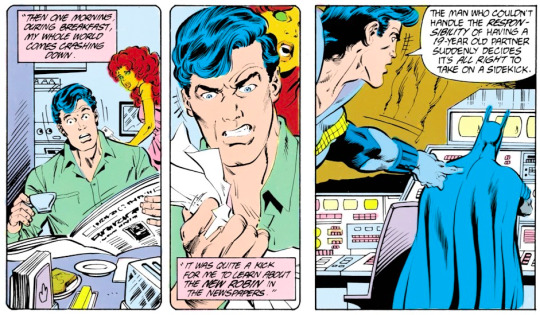
Batman #416 (1988)
If Dick stopped being Robin at 19, after 6 years, that would put him at 13 when he debuted as Robin, the same number from Batman #441 (1989).
Dick was 13 during Year Three, so 12 during Year Two, the year his parents died. Those numbers answer the first bit of my original question. I wanted to know how old Dick and Bruce were when Dick became his child. It’s a bit more of a complicated question for Dick, since he was originally Bruce’s ward, then adopted as an adult.
Based on the timeline so far, Dick became Bruce’s ward at 12 years old, while Bruce was 27.
----------
Jason becomes Robin and is adopted
As previously discussed (see Notes), Jason’s timeline is complicated by Crisis on Infinite Earths (1985-1986). Pre-crisis, Jason first appeared in Batman #336 (1983) as a former circus acrobat very similar to Dick.
Jason’s origin story reboots at Batman #408 (1987), which describes the switch-off between Dick and Jason. I’m building a lot of my timeline off of that issue. At the beginning, Dick gets shot by the Joker, and as Bruce carries him away, the media ask if Robin is dead. Dick isn’t dead, but back at the manor, Bruce decides to retire Robin as a role, based on the idea that crimefighting is too dangerous for a child.
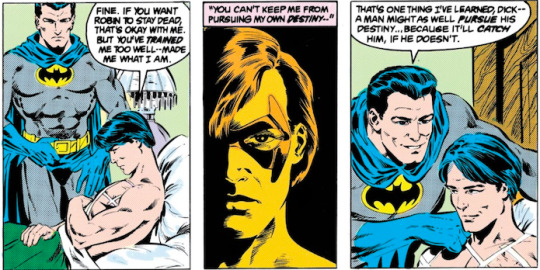
Batman #408 (1987)
This version is more or less from Bruce’s point of view, but there’s a contrasting version from Dick’s point of view later, in Batman #416 (1987). That one has a significantly different tone, and I already cited it once (page 13) because Dick talks about his age and the amount of time he was Robin.
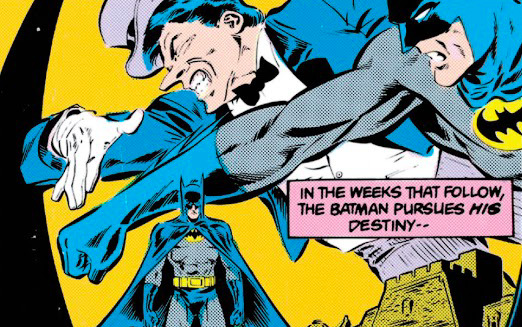
Batman #408 (1987)
The second part of the issue takes place “weeks” later. Bruce goes to Crime Alley to mourn his parents on the anniversary of their death. He comes back to find that somebody stole the wheels off the Batmobile. The somebody was Jason, and by the end of Batman #409 (1987), Bruce is calling Jason “Robin.”
Batman #408 (1987) seems to divide Dick’s departure and Jason’s introduction by only “weeks,” in the post-crisis reboot. Dick’s version of the story in Batman #416 (1987) is much less charitable to Bruce— instead of ending on a panel of Bruce smiling, it shows the aftermath of Dick in tears as Bruce walks away. Dick goes on to describe leaving the house, going to college for a semester, then dropping out. According to Dick, Bruce didn’t even say goodbye.
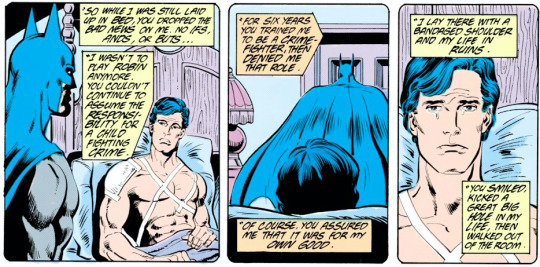
Batman #416 (1987)
I don’t think the stories are contradictory; they’re just different experiences of the same events, separated by only eight issues. Dick tells us that he was 19 when he left Wayne Manor, and Bruce chooses his new Robin “weeks” later.
As a summary, we know that Bruce’s parents died when he was eight, and that 18 years passed before he became Batman at 26. One year later, Dick’s parents died while Bruce was 27. One year after that, Dick became Robin at the age of 13. From those facts, Bruce is 15 years older than Dick.
All of my calculations of Bruce’s age are based off of the age gap between him and Dick. Dick was 19 when Jason became Robin, so we know that at that time, Bruce was 34. We also know that at that time, Jason was 12.
I can’t show a source for that number because it appears on the letter page of Batman #408 (1987), Jason’s introduction.
Even after a significant amount of investigation, I can’t find a copy of the letter page, but it’s cited by enough secondary sources for me to be comfortable using it. That issue is specifically written to show Jason’s origin, so it makes sense that it would contain Jason’s age at inception, even if the number wasn’t in the actual exposition.
From Jason being 12, we can establish a seven-year age gap between Jason and Dick, who was 19 at the time. Now we know Bruce, Dick, and Jason’s ages, and the age differences between them.

Back to my original question— when did Bruce acquire Jason? We know that Bruce was 34 when Jason became his ward, and Jason was 12. The next question, however, is when did Bruce adopt Jason? On this one, I’m making an educated guess.
Again we have to differentiate between pre-crisis and post-crisis timelines. Pre-crisis, there’s a full storyline about the fact that Bruce did not adopt Jason, although not for lack of trying. In Batman #374 (1984), the Child Welfare Bureau investigates Bruce when it notices that Bruce has not adopted Jason— and is not even, in fact, his legal guardian.
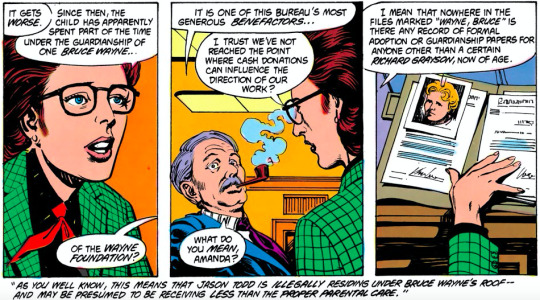
Batman #374 (1984)
The rest of the storyline is about Jason’s custody. A villain named Natalia Knight (Nocturna) adopts Jason in an attempt to get Bruce to marry her in order to become Jason’s father. In the court scene in Batman #377 (1984), Bruce says that he filed to adopt Jason sometime beforehand, although it’s unclear to me whether he means he filed between those issues or the CWB documents were incomplete.
Natalia does adopt Jason in Batman #378 (1984), and he briefly lives with her before returning to Wayne Manor in Batman #381 (1985), directly before the reboot.
I’m including all of that for two reasons: first, I do think it’s important to clarify both this version and the post-crisis version I’m about to address. Second, I spent years under the impression that Bruce adopted Jason pre-crisis because of one, well-known scene.
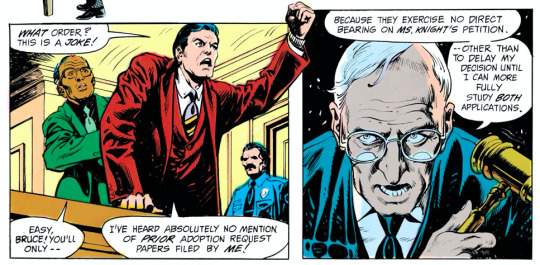
Batman #377 (1984)
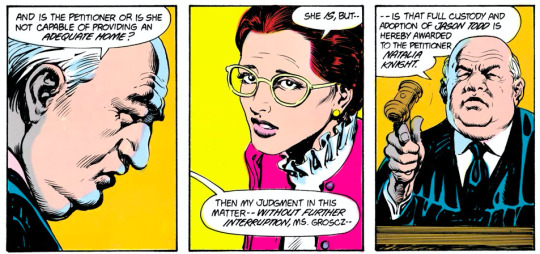
Batman #378 (1984)
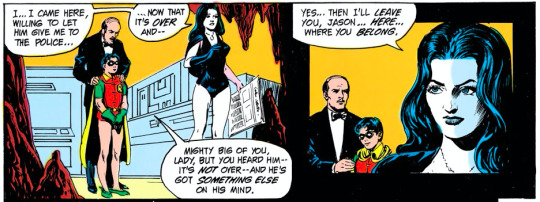
Batman #381 (1985)
Donna Troy gets married in Tales of the Teen Titans #50 (1985). At the wedding, Bruce and Dick have a conversation about Jason and about their own relationship. A few of those panels get spread around because they contain what I would consider a defining moment between Dick and Bruce.
I’m certainly not complaining about the amount of times I’ve seen the wedding conversation, but I think that, in regards to Jason, seeing just those panels has created a misconception.

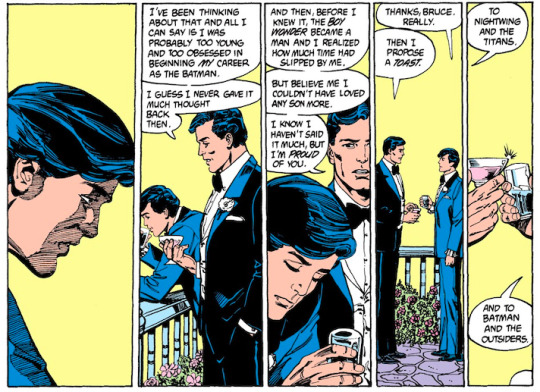
Tales of the Teen Titans #50 (1985)
Without context, it looks, at least to me, like Dick is saying that Bruce has adopted Jason pre-crisis, which isn’t true. This issue takes place between the Natalia adoption in Batman #378 (1984) and Jason’s return to the manor in Batman #381 (1985), and the panels directly before the exchange make that clear. I just didn’t see those panels until I looked through the whole issue for this project.
I’m reasonably certain that in the past, I publicly cited this issue as evidence of Jason’s adoption, and I was wrong about that. [Note: As it turns out, I was only partially wrong. See section Correction.]
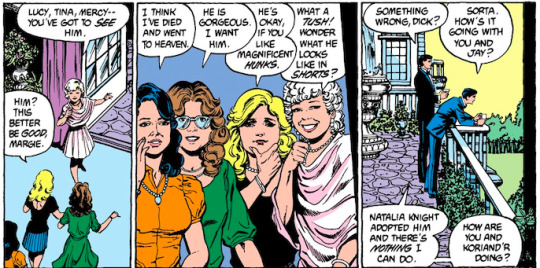
Tales of the Teen Titans #50 (1985)
As we see, the wedding conversation is in the context of the Natalia adoption. With that cleared up, and with the pre-crisis timeline filled out, let’s move to post-crisis.
In my brief read-through of Batman #404-427 (1987-1988), I didn’t find any direct references to Jason’s status. Those issues begin at the reboot and end at Jason’s death. However, Dick and Jason’s statements after the fact do tell us that post-crisis, Bruce did adopt Jason.
In Batman #436 (1989), Dick returns to the manor in the direct aftermath of Jason’s death, and while he is there, he sees that Bruce removed any trace of Jason from the house. There aren’t any trophies in the Batcave, and there aren’t any pictures of Jason on the nightstand displaying Bruce’s family photos.
Dick says that Jason was Bruce’s son.
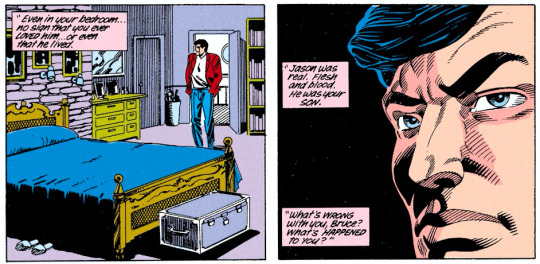
Batman #436 (1989)
I think it’s fair to ask whether Dick is being literal here, because even if Bruce hadn’t legally adopted Jason, it would still be more than appropriate to call them father and son. I’m not going to place my opinion solely on this kind of statement, even if it does appear pretty regularly from 1988 to the end of the timeline.
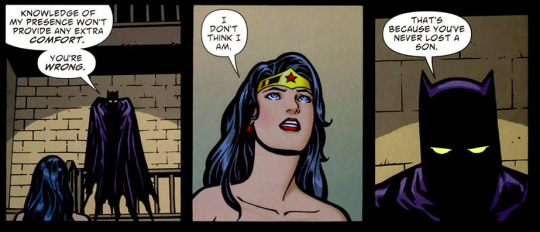
Green Arrow/Black Canary #4 (2007)
We get a more definite answer later, during Tim’s first appearance. In Tim’s origin story, he deduces Batman and Robin’s secret identities after he sees footage of Robin doing a type of flip that only the Flying Graysons could do. Tim was at the circus the night Dick’s parents died, so he saw Dick do the flip there, then saw Dick become an orphan.
Because Tim knew that Dick was the first Robin, he correctly identified Bruce as Batman and Jason as the second Robin. He tells Dick all of this in Batman #441 (1989).
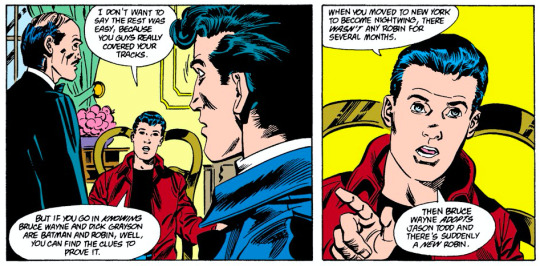
Batman #441 (1989)
Tim does specifically use the word “adopts” here, and that’s good enough for me. The last part is guesswork— I don’t know for certain how old Jason and Bruce were when the adoption took place, but I’m electing to say Jason was 12, the same age as he was when he became Robin.
I picked that number both out of convenience and because Tim seems to be putting Jason’s adoption and the second Robin’s appearance at around the same time. With that in mind, I think that Jason was 12 years old both when he became Robin and when Bruce adopted him. Using the age gap we already established, that would put Bruce at age 34.
Circling back to my original question, Dick became Bruce’s ward when Dick was 12 and Bruce was 27. Jason became Bruce’s ward, then adoptive son when Jason was 12 and Bruce was 34.
At this point in the timeline, Bruce is 34 with one former ward and one adopted son.
----------
Correction
A few days after I wrote my section about Jason’s appearance and adoption, I realized that I was missing a panel citation in my discussion of Jason’s death. The panel is from New Titan #55 (1989), and you’ll see me cite it when I talk about Jason’s death certificate.
New Titans #55 (1989) is the issue where Dick, who is with the Teen Titans, finds out about Jason’s death. While I was combing through the issue for the panels I wanted, I reread a scene I had completely forgotten about. Dick goes back to the manor to speak to Bruce, and it doesn’t go well.
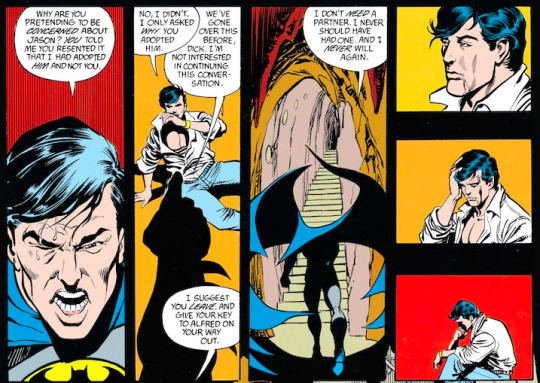
New Titans #55 (1989)
I have three comments here. First, I do think this scene is inconsistent with the simultaneous story in the Batman title. In this version, Dick and Bruce have a very aggressive confrontation, but in Batman #436 (1989), Dick appears to be returning to the manor for the first time since Jason died, and there isn’t any reference to a prior fight.
Putting that aside, Bruce does explicitly say that he adopted Jason, and that’s more, stronger verification of a post-crisis adoption. Lastly, it’s pretty clear that Bruce and Dick are talking about the wedding scene.
I already explained that the wedding scene is pre-crisis, and in the original text, that conversation is about Bruce wanting to, but not being able to, adopt Jason. New Titans #55 (1989) carries the wedding scene into post-crisis canon, changing the language in the process. In this version, Bruce has adopted Jason.
I was still wrong about the wedding scene because in the past, I used it as evidence of a pre-crisis adoption. It isn’t pre-crisis evidence, but it is, in a roundabout way, evidence of the post-crisis adoption. I wanted to clear that up before I move on to Jason’s death.
----------
Jason dies
Jason’s death is by far the shakiest point on my timeline, but I’ve chosen to put him at 15 the day he died in Batman #427 (1988).
I think it’s safe to say that Jason was either 14 or 15 when he died, and my basic conclusion is that running numbers doesn’t give me a definite answer. There’s a cop-out option based on an extraordinarily poor source, and I’m taking the cop-out.
The general consensus seems to be that Jason was 15 at his death, citation to Jason’s death certificate. Jason’s death certificate appears in two different places, and I think most folks conflate the two.
To my knowledge, the only copy of Jason’s death certificate in full appears in The Batman Files (2011), where it does list Jason’s age as 15.
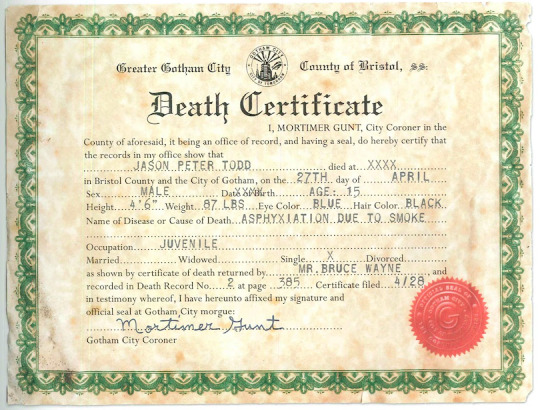
The Batman Files (2011)
Now there is a partial copy in Batman Annual #25 (2006), which I would argue is a very reliable reference when it comes to Jason. That issue is part of the Under the Red Hood story, the one where Jason returns to Gotham for the first time after his resurrection. In fact, the specific annual issue has a timeline for Jason’s events counting forward from his death.
Here’s the problem: the issue doesn’t say his age at death. The partial copy of his death certificate looks like this.
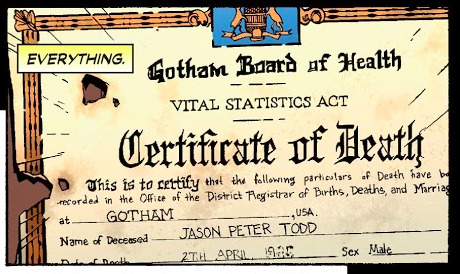
Batman Annual #25 (2006)
I think that when most folks remember a death certificate, they think of this one, the one from a very important issue, instead of The Batman Files (2011) which, as noted, is a very bad source.
I have three issues with The Batman Files (2011): the format, the publishing date, and the other information on the certificate. First, The Batman Files (2011) isn’t a comic book at all. It’s a commemorative book published in collaboration with DC in 2011. Now I don’t think that fact completely removes the book as a source, but it certainly damages its value as one.
My problem with that date, 2011, is that it’s the year the New 52 premiered. I called it a commemorative book because it’s meant to be a look back at a fully complete timeline, a kind of “this is us saying goodbye” product. The date and format alone make me hesitant to cite the certificate, but on top of that, the certificate is inconsistent with prior canon.
I am intimately familiar with retcons and conflicting numbers in the DC timeline. I made a point at the beginning of this paper to tell you that although this is my best attempt to make a cohesive timeline, assuming that I can carve out a cohesive timeline is fundamentally flawed.
I’m not saying that a single contradictory number is enough to make me disregard a source. I am saying that in this particular conversation about an already suspect source, I’m going to take inconsistency into account.
In New Titans #55 (1989), the issue from Corrections, Dick finds out about Jason’s death because a team member notices Jason’s status is set at “unknown.” Dick uses Bruce’s passcode to access restricted information, and he and the Titans see that Jason’s real status is “deceased.”
The death certificate in The Batman Files (2011) marks Jason’s height at 4’6 and his age at 15. In contrast, Dick’s scene puts Jason at 5’4, and its only reference to Jason’s age is a very relatable question from Donna. “How old was he, anyway?”
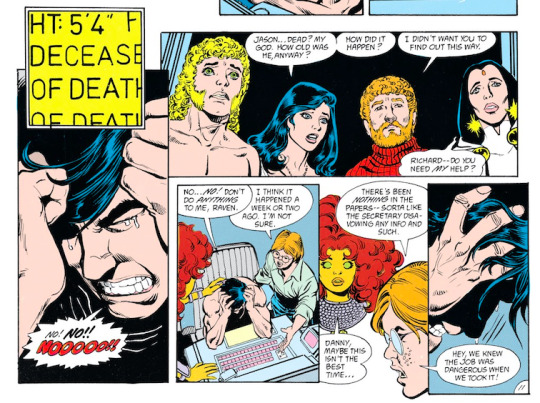
New Titans #55 (1989)
There’s a substantial difference between the two heights, and I think it’s also worth noting that for a 15 year old American male, 4’6 is in the 0.1 height percentile. In the past, I and many others have tried to justify that height along the lines of Jason being malnourished or similarly afflicted. Personally, I liked the parallel between this height for Jason and Damian’s height at his own death in 2013, and I know I’ve talked about that in the past.
I’m not criticizing anyone for using the 4’6 number, but I do think the unlikelihood of a 15 year old that size is worth bringing up.
In summary, The Batman Files (2011) is so bad of a source that I’m only willing to use it as a last resort. Unfortunately, it’s time for a last resort.
I mentioned a timeline in Batman Annual #25 (2006) that counts forward from Jason’s death. I’m not going to use image cites here because they’re just isolated text boxes labeled either “six months later” or “one year later.”
Using that timeline, we know that Jason’s resurrection took place six months after his death. He spent one year in a coma, then one year on the street, then one year with the League of Assassins. Finally, he spent a nebulous time training before he returned to Gotham.
We know that Jason was gone for a minimum of three and a half years, then whatever time “training” includes. Personally, I’m applying my best attempt at comic logic to say he was missing for somewhere between three and four years.
To understand the next bit, I need to point out that from Jason’s death on, I’m going to be using Tim’s age to track time in the same way I’ve been using Dick’s so far.
As a reminder, I know what age Bruce was when Dick became Robin (28), and I know Dick’s age at the same point (13), so I know there’s a 15 year age difference. As I track Dick’s age through the timeline, I add 15 to get Bruce’s.
In the same way, I know what age Dick was when Jason became Robin (19), and I know Jason’s age at the same point (12), so I know there’s a 7 year age difference. I can use that number ongoing.
I know that Tim was 13 when he made his first appearance as Robin, and I’ll get into that in the next section. After that, I’m placing Dick, Tim, and Cass’s adoptions based on Tim’s age.
To do that, I need to know how much older Dick is than Tim, and I can only get that by knowing Jason’s age at his death, sort of.
How long was Jason Robin? If I had that information, I could establish Jason’s age by counting up from 12, the age when he became Robin, then establish Tim’s age from there.
I can’t really answer that question. There is a panel from Batman #436 where Dick, apparently in his first time at the manor since Jason’s death says the following.
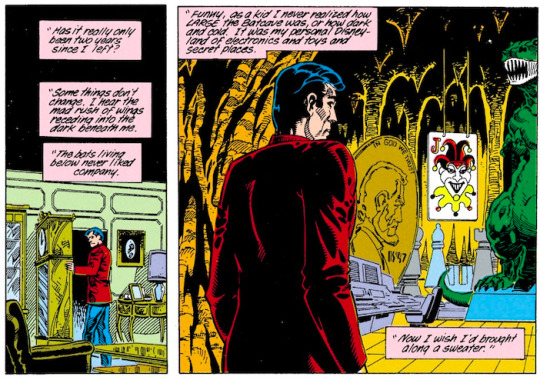
Batman #436 (1989)
My instinctual interpretation is it’s been two years since he stopped being Robin at 19, making Dick 21 and Jason 14. In my opinion, that’s straightforward plain language, but it seems like I’m in the minority on that one, and most folks read it as Dick saying it’s been two years since he was last at the manor. We know from Batman #416 (1988) that Dick’s last visit to the manor was 18 months after Dick left home.
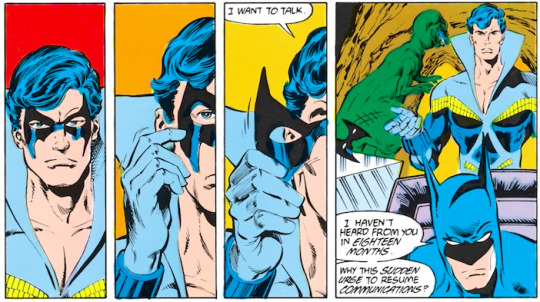
Batman #136 (1988)
I think the most honest thing to say is that Jason was Robin for an indeterminate amount of time that was somewhere between two and three years. I don’t know which number is closer. I also, if you remember, think that Jason was gone from Gotham for somewhere between three and four years, but I don’t know where in that range the real number is.
Here’s why absolutely nothing I’ve said in the past seven pages matters: I need to build my timeline based on the age gap between Jason and Tim.
I don’t know how old Tim was when Jason died.
I know how old Tim was at his first appearance as Robin, and that’s a different number.
We’ll finish this conversation in a moment.
----------
Tim becomes Robin
We begin, thankfully, with a straightforward fact. Tim’s first storyline spans Batman #440-442 (1989). The arc is called A Lonely Place of Dying, and we already talked about it. Tim, having watched Batman and Robin from the shadows for years, comes forwards in the aftermath of Jason’s death in an attempt to convince Dick to become Robin for a second time.
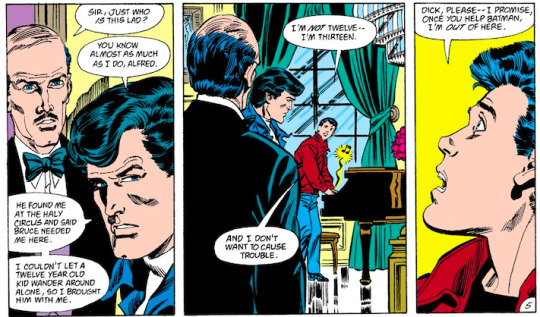
Batman #441 (1989)
We know that Tim was 13 years old at the time, but I do need to clarify exactly what time that was— an indeterminate amount of time after Jason’s death.
The word that pops up a couple of time in Tim’s first arc is “months,” from Tim and Two-Face. How many months? Who’s to say.
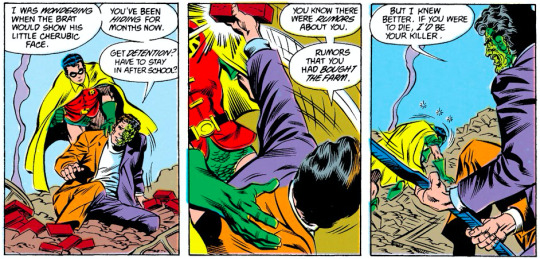
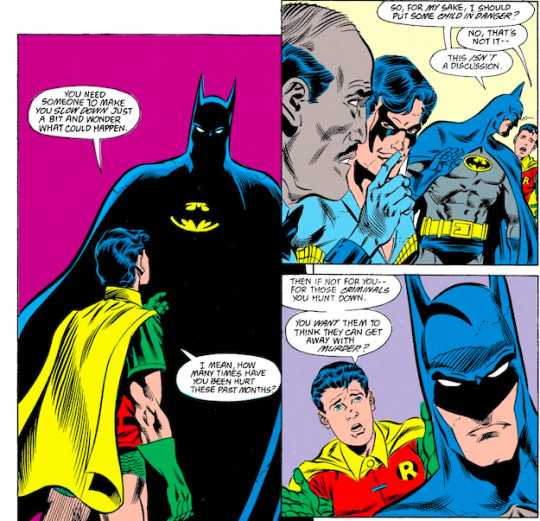
Batman #442 (1989)
So, from the top. We know that Bruce was eight when his parents died, 26 when he became Batman, 27 when he met Dick, 28 when Dick became Robin, and 34 when he met Jason.
Dick was 12 when he met Bruce, 13 when he became Robin, 19 when he left home and Jason became Robin.
Jason was 12 when he became Robin.
Bruce is 15 years older than Dick. Bruce is 22 years older than Jason.
Dick is 7 years older than Jason.
How long was Jason Robin? Unknown, but somewhere between two and three years. At that point, he died. “Months” after that, Tim was 13.
Here, we need to acknowledge that Jason could have been either 14 or 15 at his death, and at the same time, Tim was either 12 or 13. We need to know how far they are apart to calculate Tim’s age in relation to Jason, Dick, and Bruce— ongoing, we will always know exactly how old Tim is, so (if we know how far apart Jason and Tim are) we will always know Bruce, Dick, and Jason’s age from there.
How much older than Tim is Jason? Somewhere between one and three years, I guess, but I can’t really go beyond a well-researched guess. In my opinion, there isn’t a straightforward answer for this one.
Having presented my facts, here is my conclusion. Jason was 15 when he died. At the same time, Tim was 13. They are two years apart.
Why? To begin, I’m more comfortable using the number we already have for Tim, 13, than I am dropping him to 12 on the mere possibility that he could have been 12.
Second, even though The Batman Files (2011) is a terrible source, it does at least sort of indicate that the official DC position is a Jason who was 15 years old at his death.
Third, visually speaking, Jason looks closer to 15 than 14 at his death. Is that good evidence? No, absolutely not. Comic book art is definitionally variable, but I am going to pull a few panels for you to look over.
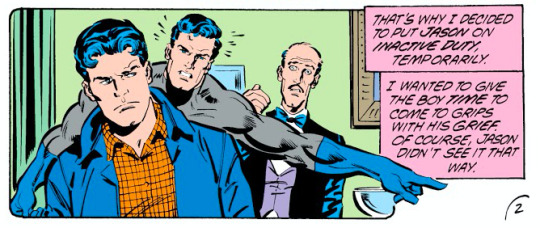

Batman #427 (1988)
Finally, I feel that Jason and Tim are, in later works, treated as if they are different ages. I’m not going to go into much detail on that one because it is purely a personal reaction, but I would refer to Teen Titans #29 (2005) as an example. That issue has Jason and Tim’s first meeting, after Jason comes to the tower specifically to attack Tim.
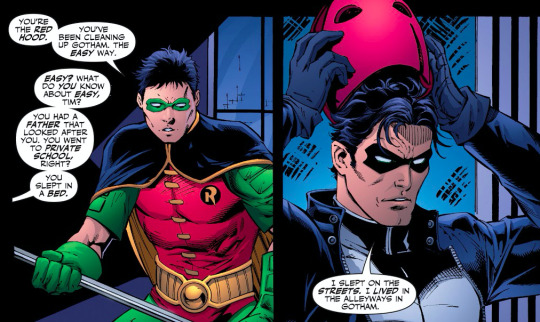
Teen Titans #27 (2005)
Another well-known issue to check out is Teen Titans #47 (2007).
My basic position is that there are so many ways, all uncertain, to slice Jason and Tim’s ages that I can take my pick. I chose the ones that most closely mirror later canon, fall most squarely into the possible range, and feel the most intuitively right.
They also have the benefit of simplicity, which was very much a factor.
Don’t agree with me? Fair enough. I think I’ve given you enough information to make an educated judgment, and I’ve also gone ahead and made a timeline in the alternative. In this one, Jason was 14 at death, and he and Tim are only one year apart.
----------
In the Alternative
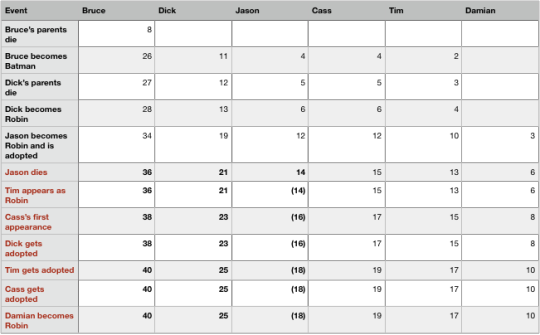
----------
Cass appears
Having progressed beyond Jason and Tim’s age gap, we reenter simple canon. I hope you’re as pleased as I am.
Cass was 17 years old at her first appearance, which we can establish easily based on two different issues. Cass first appears in Batman #567 (1999), during an arc called No Man’s Land. At the time, she is working for Barbara Gordon in the aftermath of an earthquake that destroyed most of Gotham. We learn Cass’s backstory through that issue.
Cass’s biological father is David Cain, a villain, who raised Cass in isolation, never exposing her to a verbal language or allowing any kind of socialization. By comic book logic, her upbringing gave her a near-superhuman ability to understand and anticipate physical actions, as those actions are her only form of communication.
Cain trained her as a child assassin, then took her to her first kill. Cass murdered a man and experienced, through his body language, the pain he felt at his death. Immediately afterward, she ran away from her father.
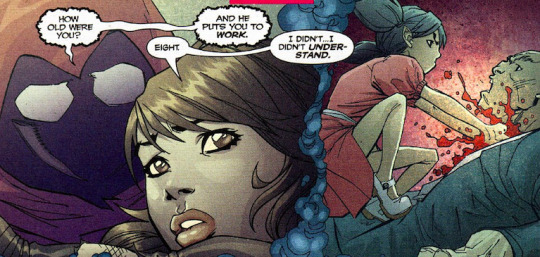
Batgirl #62 (2005)
We know that Cass was eight years old when she killed and ran. We also know that her first appearance in Gotham was nine years after she ran, thanks to Barbara Gordon’s file.
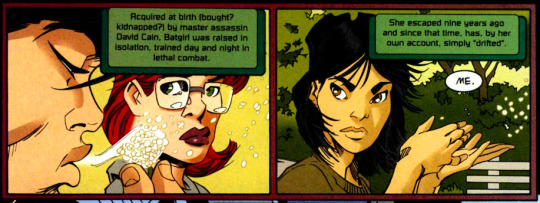
Batgirl #1 (2000)
Simple enough. She was 17. How old was everybody else? We find out from Tim’s timeline.
This next bit will come up a few times. We know that Tim was 15 from at least 1993 to 2003, established by three different issues. We know from Detective Comics #668 (1993) that Tim was 15 during Knightquest, the arc where Jean-Paul Valley was briefly Batman. Barbara tells us in 2002 that Tim is still 15, and Tim turns 16 on-panel in 2003.
In Knightquest, Tim gets his driver’s license early, at age 15, because Jack Drake is in a wheelchair. I suppose the wording here is ambiguous on a technicality, but I don’t think there’s any significant argument against Tim being 15; if he was only 14, the language would be different.
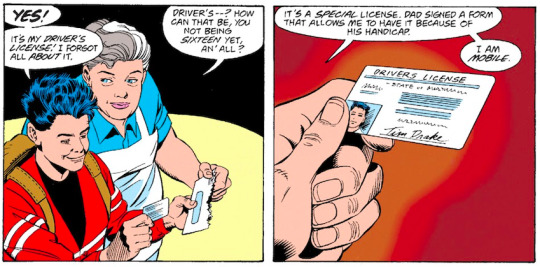
Detective Comics #668 (1993)
Next, in Batgirl #24 (2002), Barbara says she’s “sending a 15 year old” as she reaches for Tim’s com line.
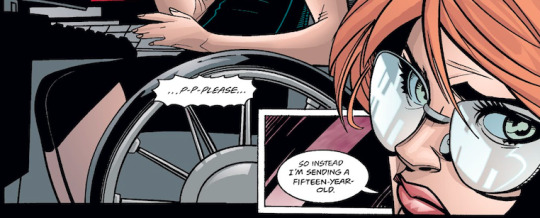
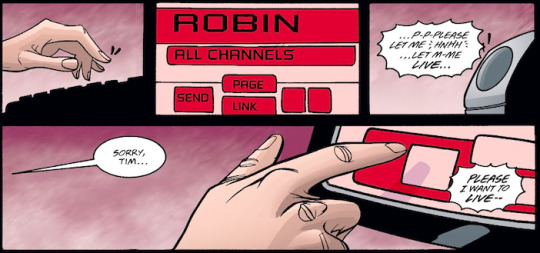
Batgirl #24 (2002)
We could stop here for Cassandra’s appearance, since that happened in 1999, between the 1993 issue and the 2002 reference. For completion’s sake, however, let’s note that Robin #116 (2003) is about Tim’s 16th birthday. He forgets about it, so his step-mother throws a surprise party.
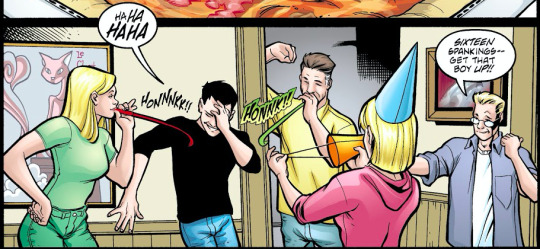
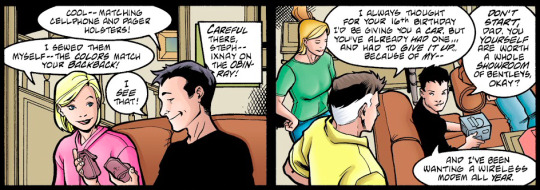
Robin #116 (2003)
Okay, so Tim was 15 when Cass appeared at age 17. That puts Bruce at 39, Dick at 24, and Jason at 17 if you’re counting by years elapsed since his birth.
Bruce met his daughter when he was 39 and she was 17, in reference to my original question. Cass is 22 years younger than Bruce, seven years younger than Dick, the same age as Jason, and two years older than Tim.
----------
Dick is adopted
This one, having already established Tim’s timeline, is very simple. Dick was adopted in Gotham Knights #17 (2001).
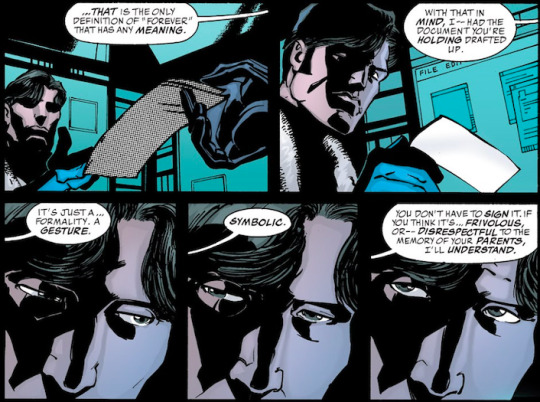
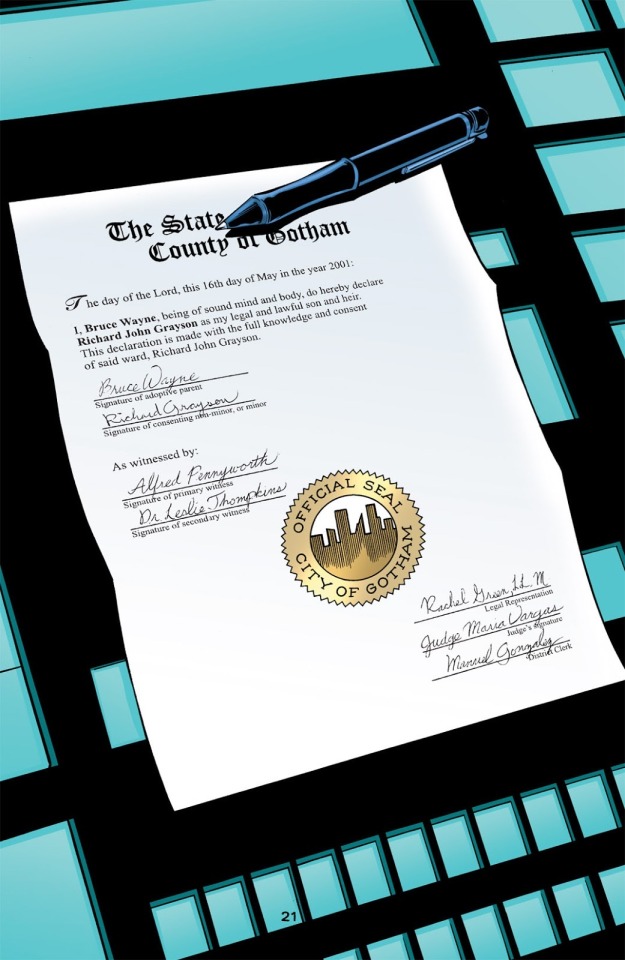
Gotham Knights #17 (2001)
Again, Tim was 15 from 1993 to 2003, and 2001 falls within that range. Tim was 15, which makes Dick 24 and Bruce 39.
At this point in the timeline, Bruce, a 39 year old, has two adopted children, one of whom is deceased as far as Bruce is concerned. His adopted children are (17) and 24. He has already met two of his future children, Cass and Tim.
----------
This is PART ONE. I’ll reblog Part Two onto this post when I wake up, which should be around the same time this posts.
#PART ONE of two#I'm going to reblog the last 10 pages onto this post as soon as it comes off the queue#timeline#mine#really lame that I can fit 50 pages into a post but then the last10 is too much
1K notes
·
View notes
Text
The makings of greatness, or why, as a ride or die Treasure Planet stan, I’m glad there’s no Treasure Plant 2
You ever see somethings that makes you unreasonably angry? Yes I understand exactly what I’m saying, and how that indicates that my emotions and opinions on this are exactly that. Opinions. There’s a good chance I have some objective truths mixed in, but that does not make my opinions based on those truths truth. If you disagree or have different tastes or opinions or interpretations, cool, let me know! maybe you’ll change my mind. That being said.
The plot synopsis for the Treasure Planet sequel makes me angry. Not like, actively so, just annoyed enough to be in a bad mood. And now you guys all have to be in one as well. Why?
Reason 1, and probably least important: Disney sequel syndrome.
Ok so Disney sequels aren’t inherently bad. I’ll stan the Aladdin sequels to my grave, who knew Cinderella could world build, obligatory Rescuers Down Under (the first one was better) blah blah blah.
But there is an inherit problem with sequels in general, and that usually has to do with cast and crew. An original piece of fiction has to grab the audience yes, but there’s also freedom in that. Media touches people in different way. The worldbuilding can mean more to some than others. Some are in it for the animation, or the character developments, or relationships. What connects with one person won’t connect with another. The problem with sequels is that different people who worked out the original material might and usually do not work on the new. And those new people are already working on that new material with their own personal lenses and experiences and interpretations coloring the old. The reason sequels (and remakes, and big budget presentations of other materials like books into movies) tend to bomb hard is because you are essentially being forced to accept someone’s fanfiction into the canon material. Usually, there’s a pretty strong correlation between more successful franchises/extension material, works staying true to the core material, original crew working on the material, and the enjoyment of the audience.
And sources say very few of the original crew remained. Some yes, but mostly voice cast. Even worse, TP2 was a DisneyToon production, not even a mainline feature. Now I’m not saying the new people weren’t talented, or passionate about the project, or were lacking in experience. It doesn’t really matter if any of those things are true or not. It’s the warping of their personal lenses I don’t trust. Fanfic I can disregard, meta I can disregard. This would have been canon.
And reading the Artbook makes is abundantly clear that the parts that touched me personally would have been missing. The very core of Treasure Planet for me was the relationship between Jim and Silver (and their exquisite animation budget). However you choose to interpret that relationship, you can not deny that Treasure Planet is a powerfully emotionally romantic movie. It’s quiet moments and emotional resonance shaped my views of intimacy with a sharp and fine touch. Silver and Jim’s bond is as undeniable and powerful as it is compelling and awe inspiring to witness unfold.
And a lot of that is owed not only to the voice acting of Joseph Gorden-Levitt (Jim) and Brian Murray (Silver), But to animators Glen Keane and John Ripa, who were the head animators of Silver and Jim respectively. Not only did Gorden-Levitt and Brian Murray deliver stunning performances, but made sure to work together and jointly play off each other in ways most voice actors don’t have the opportunity to do. And the Masters Keane and Ripa took an already stellar and carefully crafted vocal rapport and took it one step further. I highly recommend the Artbook as a good read, both Keane and Ripa talk about the journey of discovering who Jim and Silver were with delight, acting out entire scenes together using their own body language to build the characters together, using the same animation reals to animate, tag teaming in and out of the program rather than do it separately, becoming so attuned with their characters attitudes and mannerisms that you can tell they poured entire pieces of themselves into Jim and Silver.
I’m not saying the Sequel would have been inherently bad because it’s a sequel, or because a new crew worked on it, but I am saying I wouldn’t trust it with a ten foot pole.
Reason 2: Thanks I hate it (I’m saying it’s inherently bad because the plot is bad and I hate it)
I’m sorry for the length, but for you to really understand just how bad this is, I actually have to pick through every single line and tell you why it fails critically at some junctures and where it would be so simple to fix. For those of you who were unaware that there was a sequel in the works at some point, I’m pulling these quotes pretty much wholesale from the AnimateVeiws article Buried Treasure: The ill-fated voyage to Treasure Planet 2, specifically the interview with Jun Falkenstein who was set to direct the now canceled sequel. Spoiler warning, I guess?
So, from the begining
“The sequel was to pick up where the first film left off, with Jim Hawkins going to the Royal Interstellar Academy. At the Academy, he is a hotshot “natural,” but he doesn’t follow the rules very well.” - Strong start but then dropped the finish. I think the interstellar academy would be a very compelling starting point. I see no fault in it at least, it’s a good opportunity to world build. Clemence and Musket like to make a point that Jim was crafted to connect with the emotionally wounded and distant youth in a age of divorce, so showing what happens when that youth hikes up their britches and gets to work can extend on that theme aaaaaaand you dropped it. Dropped that strong start. Yes, Jim was more than a bit of a bite back rebel in the film, but that was a reactionary response to the bad place he started in. Jim was abandoned, and tied his self worth into that abandonment. His kickback against society was a reaction stemming from an inability to see his personal worth and any sort of future he could craft from it. He outgrew this, his very character development was about this in the film. His character arc was about realizing his inherent worth, embracing a sense of confidence and learning what he could do. Even disregarding that, bonus material outside of the film shows that Jim has a very strong sense of respect for Captain Amelia, her military career, and the hard work she put into it, and he’s there on her recommendation. Why would he act out in this? He is a natural yes, but the film shows he’s incredibly sharp and intelligent, if unlearned, and more than ready to learn given opportunity.
“Hence, he gets off to a shaky start – especially with his classmate Kate, who is very smart and has a type A personality. Kate’s father is Admiral Blake, the Commander of the Navy. Jim and Kate vie for top of the class but have very different skills.” - So building off this to fix the problem before. I guess the dynamic they are going for is something like “the kind of a jerk hotshit hotshot who’s got it all figured out and the straight laced rule fallowing stick in the ass rival”? I’m not apposed to to a rivalry, but lets tweak this, given how “hot shot natural jerk” isn’t really where Jim settles at the end of the film. Jim is a natural talent, who excels under tutelage, but more importantly, he has practical experience. While the time period spent on the RLS Legacy is not defined, they do sail to a deep and unexplored part of the galaxy, probably well outside of regular settlements, so no small distance, though Jim is young enough that a very long period of time would be noted in physical growth. Given comparisons to classic nautical sailing of the source time, months, perhaps up to a year? That’s a long time to spend, learning the rough and tumble basics, tying knots, experiencing food and water rations, extreme temperatures, playing with the rigging and mechanical aspects of the boat. Jim knows what it’s like to actually sail. Meanwhile, this is the Royal Academy, who probably takes in upper class second born children and pumps out military accolades for well learned mathematicians and strategists. Jim doesn’t fit in because he can visualize, he can think outside of the box, he can weld a damn engine to a hunk of shrapnel and ignite it freefalling against a metal hellscape and outrace a boat in a high adrenaline situation. He adapts where the other’s frantically look through their notes for the answer. Worse yet, he’s poor and not classically educated. Make it a class issue. In this aspect I do like Kate. Being the Daughter of the Commander of the Navy, she probably has a very technical and far more expansive understanding of navel ships, particularly the running of them. In this way Jim and Kate are perfect foils. Jim representing the poor, instinctually and practically knowledgeable crew, and Kate the upper-class, technically knowledgeable command, a dichotomy representing the haves and have nots in their skills, experiences, an class.
I don’t want to post a picture and break the post, but I do love Kate’s design. I do recommend looking up the article and checking it out. that being said, being a feline species, they messed up not spelling it Cate.
“Captain Amelia is dean of the Academy, which has a brand-new vessel: the Centurion.” - I… why, why is Amelia the dean? Additional material shows that Amelia broke ties with the military because she didn’t like their rule stickling ways and red tape. Why would she want a red tape position? She helped with a war and then bailed first opportunity to become a freelance captain so she could fallow her own rules. Even if you don’t know any of that additional material, you do know that she is a freelance captain. Why is she dean? what happened to the old one? Are they dead? Did DisneyToon kill them? Did Disneytoon kill the old dean?
“Designed by Doctor Doppler, the Centurion is the fastest ship in the galaxy.” - HE’S NOT THAT KIND OF DOCTOR!
“B.E.N. is its pilot”. - NO
In all seriousness all three of those statements show a serious problem, in that none of those characters are in fact those things. Amelia I’ve already explained. But Doppler was a debatably youngish bachelor with too much money who was fascinated by astronomy specifically and who suffered from ennui. And BEN was a navigational unit, so maybe it makes sense for him to be a pilot, but why is a robot who was functioning under a galaxy feared pirate for who knows how long given any kind of agency over a brand new incredibly important ship? These decisions were probably made to incorporate as much of the old cast as possible, to not exclude fan faves. But any decision that makes BEN a prominent part of the plot and thus gets more screen time is a BAD one.
“The pirate Ironbeard desires to commandeer the Centurion. This ruthless villain is relatively all iron – almost nothing of whom he originally was, inside and out, is left.” - On the one hand, I have a weird feeling that this would somehow violate the 30-70 rule. Buuuuut on the other hand, the Artbook does describe the decision making process of what and how was mechanical on Silver (my favorite tidbit was the wheel on his head representing his constant thinking and assessing) and states that that they in a way represent the pieces of humanity he gave up looking for Flint’s Trove. Extending that to a pirate who has given up everything could be a powerful thematic tool if used right (or intentionally)
“He leads a group of pirates to hijack the Centurion while Jim and Kate are aboard.” - ok, yeah, I’ll buy that. If they are butting heads constantly, I could see them sneaking off to the new piece of hardware to one up each other on who knows their stuff, or maybe bond over wanting to learn about the said new tech and being frustrated with restrictions.
“The Navy can’t catch the Centurion, due to the vessel’s speed and armor.”- sure
“Jim and Kate escape the Centurion. Jim decides he needs a pirate to help catch pirates. They find his old buddy Long John Silver in the Lagoon Nebula, where he is running a smuggling ring. “ - So what Jim just goes “I know just the pirate to help us” and then finds him? That journey of itself deserves it’s own movie, anything less is a disappointment. Alternative. Jim and Kate escape onto a particularly lawless planet. Jim has some tricks to keep them safe and fed, maybe he even excels in ways he’s been straight up stop gapped at the academy. Maybe his knowhow is appreciated by others who society also rejects. But Kate is a frustrating fish out of water, getting offended and worked up over things that are big deals to an average citizen but not criminals and pirates. But such reactions are putting them in danger and she needs to get perspective fast. It’s plausible maybe that Silver tracks them down through interesting rumors, but more than that, let it be fate. Neither having any idea the other is there till the second they see each other. Bonus points if Jim and Kate get in a bind and Silver is the leader of the harassers. Better yet lets add some thematic mirroring not only to the scene where Silver saved Jim from Scroop, but directly contrast it to the scene where Silver doubled back and down against the notion of caring for Jim when called out before the mutiny. *kisses finger* Touching and hilarious.
“ Silver agrees to help when he hears about the Centurion. “ - Silver agrees to help when he hears about the Centurion without Jim even having to ask. Storywise, lets make some kind of deal over how Jim, an upstanding enrollee of the academy, apparently is chummy with a pirate. Tension doesn’t just have to be external, and Kate is the daughter of the Commander of the Army. Maybe she’s recognized and this gets them in trouble. Maybe Kate has issues with her identity outside of her father’s career and need to learn a lesson about being outside of a rigid social structure?
“Jim and Kate receive a tracking signal from B.E.N. – who is currently hostage aboard the Centurion – and follow via Silver’s creaky vessel. They discover the Centurion docked near the Botany Bay Prison Asteroid. “ - While being the fastest ship yet is a good excuse for wanting it to get stolen, my suspension of disbelief breaks a little at any ship, let alone a creaky little pirate vessel, catching up to the fastest ship yet, or the tracking signal being the only way to track it to a guarded prison. Seeing as how I’ve written BEN out of this scenario lets fix it. After the events of the movie, the Royal Military swoops in after to confiscate the debris of Treasure Planet. For those in the know, canon lore states that the Planet was a giant computer, and it and the map were the byproducts of an ancient and advanced civilization. Studying the debris led to the Centurion, notable not for it’s speed, but for it��s stealth. It can cloak itself. Which is why no-one can find it. Meanwhile Silver lets it slip that he snagged the map from it’s pedestal as they escaped the planet as a souvenir. (handwave why the portal was still open with a “the whole thing was exploding, the computer froze). The map is able to track the remnants of said planet, aka the Centurion, meaning Silver has the only means of tracking the cloaked ship
“Ironbeard is using the Centurion to disable Botany Bay’s security systems. Jim, Kate and Silver sneak aboard the Centurion, where Silver reveals to Jim that he wants to take the Centurion for himself. He asks Jim to join him.“ YES. YES YES YES YES YES YES! Understanding that Jim’s decision to not go with Silver in the first movie is key here. He rejected Silver’s offer the first time because Silver had shown him he had intrinsic value, and Jim finally felt that the natural gifts he had were worth cultivating, that he did have the chance to explore who he could be on his own terms. Jim was comfortable being on his own, because he felt capable. Now, Jim and Silver bring out the best in each other, and the time apart has done them harm. Jim’s strings of social rejections are starting to fell like a glass ceiling he can’t overcome, and is finding more and more comfort in being a big fish in a pirates small pond, and the emotions of of being wanted that come with Silver is a powerful drug. But it’s a one way ticket away from any opportunities he could work towards, not to mention his barely repaired relationship with his mother. Meanwhile Silver has been slowly slipping back into the colder, more selfish self he was, a necessity for his lifestyle, and doesn’t want to loose his connection to Jim and what Jim brings out in him, but is still far enough gone to make the offer and try for the boat anyways, even if he knows it’s not what’s best. It’s an emotionally compelling decision. You want them to say yes, you know they shouldn’t
“Kate overhears this and is horrified, especially since the two have, of course, started falling for each other during the adventure.” - Hate. this I hate. Leaving shipping to they way side, what’s that “of course”? why do they have to fall for each other? Why the Disneytoon sequel love interest? I have a feeling her characterization would come at the cost of it. Why can’t they be rivals? why can’t they develop a mutual respect outside of attraction? Why can’t they both learn an individualized lesson about finding their own place in the world outside of social constraints as foils without macking? I hate this concept. Kate overhears, and is horrified, because Silver is a Pirate which is actually in universe get yourself hanged offense, and Jim is considering this, and they are going to steal a VERY IMPORTANT BOAT and and leave her stranded in a dagerous prison, and are making an objectively morally bad decision.
“Ironbeard discovers the intruders, charging into a fight in which Silver is injured. Meanwhile, the other pirates throw down ladders to the prison below, allowing swarms of elated prisoners to climb up into the ship. Silver, Jim, and Kate exit the Centurion amidst all the confusion. However, Ironbeard shoots down Silver’s ship. They plummet to the prison asteroid below, crash-landing” - cool. Drama. But for my purposes, lets tweak it so Silver isn’t injured yet. But I really want to emphasize that this attack does not interrupt before Jim can react to Silver’s offer. Even something as tentative as “I’m not sure” has consequences. None of this “misunderstanding” BS.
“ Kate is angry at Jim and storms off. “- again, make it clear that Jim showed a real chance of agreeing to steal the ship. if she’s angry before he had a chance to answer that’s contrivance for drama’s sake. Give her a reason to be mad
“ Jim is about to blow her off as well when Silver tells him to give her a chance. He reveals a part of his past through a flashback, when a young (non-cyborg) Silver screwed up a relationship with the love of his life – a decision which directly led to his life of piracy. “ - nope. nope nope nope . I’m gonna put a big old * here because this is reason number 3 why I hate this potential movie, and I will get to that believe me, but here’s me, putting a pin in it. That being said, have Silver selfishly try to double down on getting Jim to join him in a three way argument instead. This is the conflict of the film. Kate, who was learning to grow outside of the strict restrictions of her life and do her own work, make her own way, is being rejected. She is as morally repulsed as she is hurt that she wasn’t included, and hates herself for that hurt as well. Jim is torn between the freedom of what he could be after the academy paired with the strict social constructs around it, and the freedom of a life “full of himself and no ties to anyone” but running from the law and the two friends they represent. Silver is the aggressor here. He likes Kate, he does, but he loves Jim and only has one place in his heart, and has spent his life being selfish. There’s already a crew on board, and Iron beard is hooked into the Centurion. With having the only other means to navigate, they take down ironbeard, the rest will surely fall in line. This is paydirt. A fantastic ship, a bloodthirsty crew, and Jim.
“Silver has a very dangerous cargo with him that he had been trying to smuggle and sell for a fortune, which has the power of a neutron bomb. Jim, Kate and Silver reconcile and work together to fix Silver’s ship and prevent the Centurion, filled with the most evil pirates in the galaxy, from going on an insane robbing-and-killing spree. At the last second, Silver reluctantly gives up his “retirement fund” in order to destroy the Centurion, with Ironbeard and all the pirates on board.” - this entire section needs rewritten. That’s a mcguffin Silver put it away. I have retconned the mcguffin to be the old map, so that is now moot. Now to not blow up the ship. Afterall, Silver and Jim have both already overcome what Treasure Planet represented with it’s destruction. Rather, B plot
If we are that desperate to have past characters in, let’s have Amelia and Delbert back home. When the Centurion is captured, Amelia immediately volunteers to fallow, feeling responsible for Jim and secretly pining for some adventure. Delbert feels the same, and he to a bit of an adrenaline junkie after the events of the first movie, but they have the children to think about and only one can leave. Delbert is the one chosen to help by the navy officials searching for the Centurion. While Amelia bickers with the Admiral Blake over his pragmatic but emotionally distant decisions over the situation of his missing daughter, Delbert is an astronomer, and is blah blah blah science meta, fallow the flashing and bending lights around the cloaked ship to find it. As in Delbert is helpful. Amelia in a reflation to Admiral Blake, is torn between her family and commandeering her own ship to help. Blake is frustratingly headstrong in his decisions, and the script makes it seem like that emotional distance is disinterests, but reveals to the audience that it incorporates a great deal of suppression of his anxieties and worries over his daughter, and trust in her abilities, though he has issues expressing this pride to Kate herself. Amelia, Delbert and fam make what is probably a poor decision in commandeering a ship and leaving on their own to track the Centurion, the navy hot on their heels.
Back to A plot, the navy is approaching. Jim has to make a decision. He is the only one who knows how to unmask the ship using the old ones tech without training, as it’s based off the map. While Kate and Silver are distracting iron beard, he has to either steal the ship and sail off, or uncloak it for the navy. Iron beard is taken down, but not without Silver getting injured. Jim decides that Silver’s life is worth more than anything, and after agreeing with Kate that she’ll commandeer a doctor and wont let Silver die, uncloaks the ship. The Centurion is retaken in a blaze of naval glory that is the action climax. The pirates fight back up are over run. Maybe Kate gets taken hostage as the Admirals daughter, as an opportunity for a resolution with her arc as Blake’s distant daughter, though obviously said resolution comes at her showing her abilities in taking care of herself and the practical skills she has learned.
“Silver again parts from Jim and Kate, telling them to take care of each other. A few years later, Jim and Kate graduate with honors, while a proud Silver secretly watches from the shadows, smiling” - Boooooo. Kate and her dad make up, and she challenges him that she’s going to one day Captain the Centurion, with him understanding that she needs less a mentor and more an emotional support while she works her way up the ranks. She invites Jim to be her first mate, to which Jim accepts as a navigator, (a thing I’ve pointed out to be his real strength in another post). But to Silver, who has been “pardoned” for his part in retaking the Centurion, the movie hinting that he to would be on the eventual crew there I fixed it fic to come I s2g.
yeah there’s a lot of good there, but it’s so easy to fix the bad it’s frustrating. which brings me to
Reason 3: that little pin
“ Jim is about to blow her off as well when Silver tells him to give her a chance. He reveals a part of his past through a flashback, when a young (non-cyborg) Silver screwed up a relationship with the love of his life – a decision which directly led to his life of piracy. “
Nope nope nope I’ll tell you why.
First of all, sources like the artbook say that Jim is so Important to Silver because he’s the first person Silver has ever let become important. he’s specifically stated to have no family, never married, no children. And that’s something he cultivated actively. His life of piracy, his metal limbs, his loneliness and moral failings were all gleefully accumulated for one reason and one reason only
Treasure Planet.
Treasure Planet was the great love of Silver’s life. It was a lifelong obsession. It destroyed his body, took his youth, his opportunities and nearly his life. He broke Jim’s heart over it.
And he let it go. For Jim.
And Jim understood this
This is the crux of treasure planet’s very themes. This is where Jim found self worth. Another person finally looked at him and said “you matter, you matter more than anything. I like being around you and I choose you first.” and it made Jim realize he’s someone worth choosing.
The treasure was EVERYTHING to Silver, and Silver let it go, for Jim.
That one line there, attributing the start of Silver’s fall to a girl? that actively retcons the entire theme of the previous movie. IT rewrite the emotional linchpin of Silver’s sacrifice of the gold. And actually fuck that. right into the ground. I do not accept. I do not pass go. I refuse. Fuck you non existent movie. That makes me mad. every single time. Hate I shall never let go.
No
#Disney#Treasure Planet#Jim Hawkins#long john silver#john silver#long post#meta#god I hate this non existent movie#This outline is the closest I've ever come to writing spitefic and its still up in the air#Treasure Planet is such a romantic movie and you come into my house and try to shred the emotional core and themes by recontextualizing?#fuck off#Fuck I love Treasure Planet#sequel synopsis can die in a fire tho
333 notes
·
View notes
Text
When Should You Worldbuild for Your Novel?

Every year, we’re lucky to have great sponsors for our nonprofit events. World Anvil, a 2020 NaNo sponsor, is a writing software that helps you develop and organize your characters, plot and world setting. Today, World Anvil Director Janet Forbes shares some tips for worldbuilding at all stages of your novel:
As a writing and worldbuilding expert, and the director of the award-winning worldbuilding and novel writing software World Anvil, I get asked this question a lot: at which stage during the novel writing process should you be worldbuilding? Should you be worldbuilding as you plot, as you draft, or as you edit? And—I see you out there, you glorious pantsers—what if you don’t plot? When should you be worldbuilding?
A quick disclaimer & explanation:
EVERYONE IS DIFFERENT! (Isn’t it beautiful?) This post is full of suggestions. If in doubt, try things out! But not everything will work for everyone. Experiment with these ideas, and develop a novel writing process that works for you!
Some of the best worldbuilding articles are only a few sentences—just long enough to document your ideas! You’ll probably expand them a bit through the drafting process as you discover or decide more details. But don’t feel you have to write the entire “Silmarillion” for your world! Longer articles often just mean more to read through when you’re in a hurry.
When to worldbuild as a Plotter?
Are you a plotter? Prefer to take a run at a first draft with a solid plan? Then here are some of the best places to work worldbuilding into your novel writing method!
Worldbuild the big stuff during the plotting phase
As a plotter, a lot of the big worldbuilding ideas probably come as you plot your novel. You’ll need characters who live in settlements, and were probably educated in organizations. They may or may not adhere to certain traditions or religions. You might add magic systems, supernatural powers, and/or futuristic technology (which you’ll need to know the limitations of!). Writing down your ideas NOW means that you have them safe, and won’t lose them!

Worldbuilding your organizations, like Nations, Religions, Jedis, Police Forces and Universities, will help give them more impact, and make your world feel more dynamic and real!
Image Credit: Davina, made on World Anvil.
If your novel is an event novel—aliens invade, the Earth quakes, or a zombie virus is let loose—then write a bit about the nature of the threat. If you’re creating a character novel, make sure you have some notes on your main character’s background, mentors, relationships, education and skills.
Worldbuilding these elements of your plot—even in just a few notes—before you start the first draft will really help you down the line! You can plan all of these out using the worldbuilding templates in World Anvil. They give you the freedom to create WHATEVER you want, help you connect everything together, and make everything searchable when you need it!
Worldbuilding during Draft 1—character experience and juicy details!
So, if you’re anything like me, you’ll probably find that something magical happens during your first draft. You start to consider your world through your character’s eyes! This means adding a lot of details to your worldbuilding—both SHOWING rather than TELLING, and sensory detail.
For example, you won’t tell your readers that an organization is evil. Instead, you can show a poor man in the stocks because he couldn’t afford his tithe or tax. Add that punishment to the worldbuilding article about the evil organization, so you can remember it for later (or for book 2!).
Also, as your characters interact with places and people, they’ll feel, smell and hear (and maybe taste) details which heighten the experience. This makes your writing more evocative, and invites readers to feel they’re living in your novel, too!
Add these details—you can even copy-paste relevant paragraphs as quotes—into your worldbuilding articles. Some Plotters prefer to do this scene by scene as they write their first draft. Others (like me!) prefer to do this as a separate stage, once the first draft is done. Read through the first draft, and add quotations or details into your worldbuilding articles. Future-you will thank you!

A fantastic example of a quick character profile! Hotlinks (shown here in red) help you link everything together in your world, so you can find things easily!
Image Credit: ShyRedFox, created on World Anvil
Worldbuilding as a Panster!
If you’d rather fly by the seat of your pants than plot out each step of your novel, then congratulations—you’re a Panster! You probably love the exciting feeling of discovering your story as you write your first draft. So here are some ways you can work worldbuilding into your novel writing process!
Characters are worldbuilding too!
Most pantsers I know love to craft characters, even if they don’t know what will happen to them over the course of the story! And characters are full to the brim with worldbuilding opportunities!
For example, the places your characters were born, went to school, travelled—they are all important locations to worldbuild in a few sentences. Which country is your character from? Do they fit in and, if not, which traditions or view points do they chafe against? These are all excellent places to start your worldbuilding, even before NaNoWriMo has started. You’ll still be pantsing—just Pantsing with Purpose!
And remember, none of these ideas are set in stone - you can always change them later. It’s just a jumping off point, to give you inspiration.

Characters are worldbuilding too! Writing out a detailed character profile is a great way to discover more about your main character. World Anvil provides prompts to help you flesh out your characters even more.
Image Credit: Dhelian, created on World Anvil
Plan worldbuilding using the “Jot, Bin, Pants” method!
The Jot, Bin, Pants method (originally developed by Cassandra Lee Yieng) is a way to plan without plotting! Once you have those scenes, scan through them quickly. You’ll already spot elements you can write short worldbuilding articles about! If a scene takes place in a ship, a smart townhouse, or an abandoned castle, write a few sentences about that space. What material is it built from? What feelings does it conjure up?
Now you have a few notes on that location, you’ll be able to recapture the feeling much more quickly during crunch time, and get your words written!
Keep worldbuilding notes during Draft 1
Another helpful moment to make notes is at the end of each writing session during Draft 1. Try spending 5 minutes documenting the people, places and things you came up with. World Anvil’s tree layout can give you a lot of inspiration when you’re glancing over your setting to decide what should happen next! So if you mention a creature, a character, a location or a technology, scribble down a few notes about your ideas. You never know - it might save your character’s life!
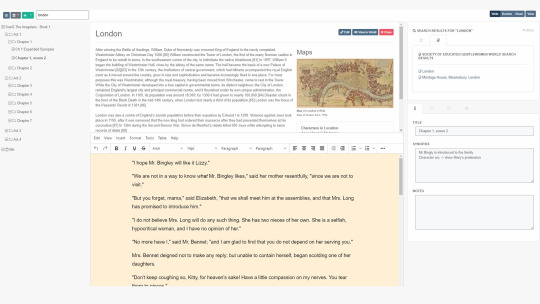
With World Anvil’s novel writing software, you can easily reference your worldbuilding and update your series bible either AS you write, or after each writing session!
The worldbuilding review phase
Regardless of Plotterism or Pantitude, you should eventually have Draft 1 of a book! Granted, it probably needs some tweaks right now. But there’s a story there, characters, ideas, and an ending. Congratulations!
Now is a great time to take stock of your worldbuilding. As you read through your novel, build up your world bible or series bible. Make sure you have articles for each major character, for the places and things you’ve introduced - just a few sentences is fine. But as you edit and flesh out your novel, these will be great references to have, and it’ll speed up the next phase no end!
Worldbuilding and Structural Edits
During structural edits, i.e. re-editing the actual story and big ideas of your book, you’ll find that keeping an updated version of your series bible is really useful! You can do this as you edit (which is what I prefer) or at the end of each draft.
By the time you’re at line edits, you’ll be done with your worldbuilding… and ready to get on with your novel’s sequel! And I can promise you - you’ll be thanking past-you for keeping such good worldbuilding notes in your Series Bible!
If you want to keep your worldbuilding organized and instantly available in your novel writing software interface, then check out World Anvil! We’re recommended by Writer’s Digest, as well as bestselling authors like Brian McClellan, Chris Fox, Jenna Moreci, and literally a million other writers and worldbuilders! You can also pick up a 25% discount with the coupon code NANOWRIMO!

Become the ultimate writer and worldbuilder : NaNoWriMo participants get 25% off World Anvil!
Whatever you’re writing, and whenever you worldbuild, World Anvil will help to develop and organize your characters, plot and world setting, link everything together, and write your novel in our integrated novel writing software!
And right now you can bag 25% off 6 & 12 month memberships of Master Tier and above, using the coupon code NANOWRIMO on checkout!

Janet Forbes (pen name J.D. Blythe) is a published author and the Director of World Anvil, the ultimate worldbuilding and novel writing platform! This award-winning software helps you organize, store and track your worldbuilding as you’re writing your novel. Our novel writing software, accessible from anywhere, integrates stunningly with your worldbuilding. And when it’s time to publish, you can export, or publish directly on the World Anvil platform and monetize YOUR way! Check it out at World Anvil.
358 notes
·
View notes
Text
To add on to the “things cost what they cost for a reason” conversation, when I made that cosplay shirt, which looks dead simple from the outside, I got a few requests to make it for others and had to politely decline rather than:
A. Turn myself into a one-man shirt factory
B. Deal with the awkward conversation when the price of the shirt is miles above what they expect.
This post got long, so courtesy break:
So just for full disclosure, here’s the rundown of “what” and “how much”:

So on first glance, this is a dead simple shirt. Even though the shirt is tied to a fantasy anime, the anime uses a lot of medieval and 18th century influences, so I decided to use construction methods from that era. So, bonus - the pattern is all rectangles!
Now here are the complicating factors:
1. You need to use the right fabric to get the right look. This garment has a LOT of places where it gathers up on itself (the waist and the elbows), so it needs to be a thinner fabric to not look chunky, and it needs to have a good drape. I was also still concerned with being period-correct, so I choose a lightweight 100% linen.
Material Cost: $45.
2. In this case, I had made shirts like this before, so I already had the pattern tweaked for my measurements. While you can make this style of pattern to a standard size (there’s one described in the book I used to mock up the pattern in the first place), for this specific shirt I don’t like to do that for a few reasons, but mainly because this shirt has a few more “requirements” than the garment it’s based off of.
Mainly that the sleeves need to be drawn up without a TON of excess fabric, and that it’s meant to be at the low hip/upper mid-thigh rather than gathered up into your pants as underwear.
Long story short, suddenly my “standard undershirt pattern” needs to account for arm length, torso width, hip width, and shoulder-to-thigh measurements, which will be highly individual.
Time Cost: Assume one hour for educating client on taking the measurements, another hour for pattern adjustments.
3. For more authenticity, I handsewed the whole dang thing as machine stitches would be a visual indicator that this is a modern garment. I could do it by machine, if the client wanted, but the pattern is set up to use narrow rolled hems and felled edges. I could use a rolled hem foot and serge the inside hems, or do French seams, and topstitch those I couldn’t (the chest slit facing), but that still takes awhile.
Time Cost, Handsewing: 5-6 Hours.
Time Cost, French Seams: 2-3 Hours
Time Cost, Serging: 2 Hours
4. There is some hand-finishing that NEEDS to be done - the grommets. I don’t have the ability to do machine-sewn eyelets, and because the material is lightweight, I decided my best option was to set metal grommets and then thread-cover them for extra strength.
Time Cost: 2 Hours.
So, finally, we’re at the final breakdown of what this shirt would cost if I were making one for a client...(and this will include everything I can remember - it doesn’t make sense to say “But you already had thread!” in this context, because if I’m making multiples of these for other people, these things need to be accounted for).
Materials:
Fabric: $45
Thread: $3
Grommets: $10
Lacing Cord: $5
Total Material Cost: $63
Time and Labor:
Typical recommended ‘per hour’ cost for skilled labor is $30/hr, so let’s use that first:
6-10 hours for a total of $180-$300, depending on methods used.
So now the cost of the shirt is $243-$363, before any sort of shipping is brought into the calculation.
Even if I felt like going absolutely bare bones on the work time compensation ($15/hr), the shirt would still cost $153-$213.
And then my job from there is to convince people that a very simple-looking shirt is worth dropping about $200 on. In this era of fast fashion, I’ve seen enough to know that people who don’t ‘know’ will opt to find the ‘closest match’ online for $30 instead (and still consider that pricey), and if I’m really unlucky, I’ll get an earful about it along the way.
This is why I almost always refuse commissions from people I don’t know...
29 notes
·
View notes
Note
Any books you recommend? I want to read as much as I can to educate/inform myself on paganism/wicca/witchcraft because I am so fascinated by it all. I would love to practice it. But I want to know a lot before really starting.
So if you have any books that helped you a lot when starting. It would be really great!!
Sorry for not answering this sooner. I saw the question and had to let it sit in my inbox partly due to finals but also because it's a bit of a tricky question for me. Since I am Swedish most of the sources I've read are in Swedish and I would be more than willing to recommend some of them if anyone is interested. However since you asked the question in english I'm gonna have to assume that you'd prefer some sources in english. I am a norse pagan so all of my recommendations will be related to that. Many of these sources are good not only for understanding the norse mythology but also the cultural context in which they were written and the religion was practiced in.
Before I begin to answer this I think it is important that I mention that you can practice in pretty much any way you want. Considering we have quite little source material from the actual viking age about exact practices during rituals it is quite hard to say what the RIGHT way to worship is. The one thing I can say is to be respectful towards the Gods and towards nature. Now let's get into the meat of this question.
As some of you are aware I'm currently taking a university course in Old Norse religion at my university. Some of the sources I've come in contact through this course are in english so I'll start by recommending them!
1. More than Mythology: Narratives, Practices and Regional Distribution in Pre-Christian Scandinavian Religions by Catharina Raudvere and Jens Peter Schjødt. (Specifically the chapter called "Continuity, Change and Regional Variation in Old Norse Religion", but I'm sure the whole book is interesting. It's available on google books.)
2. Old Norse Religion in Long Term Perspectives: Origins, Changes and Interactions by Anders Andrén. (Haven't had the time to read this one yet but I will soon and it looks really promising. Also available on google books.)
There were a few more in english but i think these two were the most relevant. They are academic books however and focus a lot on historical facts and theories. As for actual, modern day practice I'd recommend internet sources.
1. https://asa-community.se/ Here is a link to one of the more serious norse pagan groups in Sweden. The website has the option to be viewed in english. I am not part of this group but from what I have heard and seen on their website they are serious in their worship and it's founded on good principles. They might not offer the most in terms of facts but they have some good tips for how to think and how to practice the norse pagan faith, specially if you are new and need some guidance. Of course this is just one way to do it, there are multiple ways to worship the Gods as stated above.
2. Life and Afterlife: Dealing with the Dead in the Viking Age by Neil Price: https://www.youtube.com/watch?v=uu2gN8n15_A (A lecture by the archaeologist Neil Price at the University of Cornell. It's about practices concerning burials and an analysis of Ibn Fadlan's text about meeting with Rus vikings. I'm sorry, I'm a history major so these sorts of videos and sources are important to me).
3. Jackon Crawford on YouTube. He is a scholar at the University of Colorado and specialises in Old Norse. His videos are good but sadly I watch them quite rarely. https://www.youtube.com/c/JacksonCrawford/videos
4. Lastly of course the eddas and other norse literature. However I am unsure what english translations are good.
Finally, before I finish this post bc it got super long, a book that I love and perhaps was more of what you were asking for anon.
1. Norse Gods by Johan Egerkrans. (Beautiful illustrations that accompany some of the stories from the Eddas in an easy to read way).
Sources are important and it is a constant issue within this community to know which sources are good and which are less good. All sources should of course be approached with a critical lens! I'm sorry that this answer is a bit all over the place, I had a hard time answering this question tbh. I hope it is a bit helpful at least. I did not include any sources about wicca/witch stuff bc I do not identify as a witch. For that I'd have to direct you, anon, to a different blog I'm afraid.
Thank you for reading and thank you for asking anon!
34 notes
·
View notes
Note
Hey! We're protestant so my family doesn't really celebrate Lent. I know you're supposed to like, give up something important to you, but the only things I can give up right now are technology things and then I'll have nothing else to do in quarantine. How do you celebrate Lent?
Hi there! I’m excited to see you’re interested in Lent! (Btw, some Protestant denominations do observe Lent, even while some don’t.) It’s a powerful season of the year in which we reflect on God’s ultimate solidarity with the most disenfranchised of humanity through the Person of God who is Jesus’s ministry, wilderness wandering, and crucifixion. In pondering Jesus’ solidarity, we are moved to gratitude and seeking deeper relationship with God, and also to solidarity with the oppressed ourselves.
Many people do give up something as part of their Lenten observance. It’s supposed to be something you feel is somehow inhibiting your relationship with God (perhaps excess tv time or alcohol), or else something you give up to cultivate compassion for those in the world who are without that thing (such as engaging in healthy forms of fasting; this compassion should eventually lead to action).
(Unfortunately, Lent is sometimes used almost as a “New Year’s Resolutions: Part 2″ instead of a religious observance -- a chance to start up a diet instead of a chance to nourish one’s spiritual life. But at its best, giving up things for Lent follows what I said in the previous paragraph.)
However, Lent is about far more than giving things up. In fact, this year, when so much has already been stripped away because of the pandemic, many Christian leaders are advising not using this Lent to further deprive yourself. In this time that is so full of trauma and worry and isolation, no one should “give up” anything that is helping them get through it!!
So yeah friend, don’t give up the technology that helps you find a little joy in your day, and lets you connect to others in the midst of quarantine. Instead, you might add something on to your life --
an extra moment of meditation or prayer each day;
or picking a spiritual book you’ll read a little bit of each day (or a podcast if you don’t like books; or an online devotional, etc.).
Or you might commit to performing several intentional acts of kindness each week;
or offering money (if you are financially able to) to good causes;
or educating yourself about how to be in solidarity with a marginalized group to which you don’t belong.
You might also commit to finally doing something that you need to do but have been putting off -- such as finally getting a therapist, or finally getting help for a problem you’ve been keeping secret, or finally setting boundaries or letting go of a harmful relationship -- actions that take so much courage, but will help set you free to pursue the abundance that God wills for you.
_____
I offer some suggestions for reading materials and other Lenten resources in this recent post.
I especially recommend the article “The Unintended Consequences of Spiritual Discipline” by Emmy Kegler for commentary on the risks involved in viewing Lent solely as a time for self denial or “giving things up,” especially for particularly vulnerable groups. Please keep in mind that God does not call us into the kind of self-denial that manifests as self-hate or meaningless suffering -- God longs for abundant life for every one of us!! Take care of yourself <3
I’ve read a few good books already in the past couple weeks that would also make good Lenten reading (reading a lot of books is my own commitment this Lent):
The Art of Dying Well by Katy Butler -- argues that to die well we must live well; and we don’t have to let go of any fear of death, but we do have to be willing to accept that death will come one day and let that knowledge motivate us to pursue purpose and community so that we will feel fulfilled at death. Since one important aspect of Lent is memento mori, but this past year we’ve been so inundated with death and grief that being told to fixate even more on our own mortality seems like a cruel joke, this is a particularly good book for this Lent -- because it helps us face the death we’re already surrounded with. It does share some pretty intense hospital death scenes, however, so if that’s not something you’re in a good place to be reading about, you might instead try.... .
Everything Happens for a Reason: And Other Lies I’ve Loved by Kate Bowler -- this book also faces the prospect of death head on, through the point of view of a woman with stage four cancer. Kate Bowler explores where God is (and is not) in the midst of suffering and death; even has a chapter specifically about Lent. And if you aren’t a big book person, Bowler’s podcast Everything Happens is even better than the book! She interviews all sorts of different people about God and suffering. .
Learning to Walk in the Dark by Barbara Brown Taylor is a book that also explores in accessible and warm language what faith can look like in moments when God seems absent. .
The Black Christ by Kelly Brown Douglass (I recommend the 25th Anniversary Edition because I like its introduction but if you can get another version cheaper for free that’s great too) -- a wonderful introduction into Black theologians’ views on Christ as Black, as one who identifies wholly with those who are oppressed by racism but also by other forms of oppression; it’s a fairly quick and easy-to-understand read, so it’s perfect for non-academics who are interested in this topic but struggle with the heavier texts. .
Living Buddha, Living Christ by Thich Nhat Hanh is what I’m working on now and I’m already in love.
Finally, I’m super pumped about this new disability-centered devotional with readings for every Sunday of Lent plus every day of Holy Week (the final week of Lent, leading up to Easter).
Please let me know if you have more questions! I pray you encounter God in life-giving ways this Lenten season <3
47 notes
·
View notes
Note
Hey, can I get some advice on improving my descriptions / becoming more literate? I feel like I'm really dull when it comes to my writing and would like some advice! Thank you!
You absolutely can, thank you for asking! I apologize it took me a bit to get to this, tumblr didn’t show me notifications and I’ve been rather busy. Hopefully, I can offer some good advice!
Please, keep in mind that, as always, it is just my advice. If these things do not work out for you, don’t feel bad about it! You just need to find what does work for you. And, if you have anything that jumps out at you that you wish me to elaborate more on, or even that simply occurs to you more specifically to ask as you read, please, do ask! I am always happy to have those questions, of course.

Being more literate in itself can help. It can also be a hindrance, however, as we tend to compare ourselves to others negatively. I’d say not to do that, but it’s something you have to unlearn, not something you can simply stop doing. We’re taught a lot of self-criticism by comparison in both the educational system and our society. You’ve got learn to approach material you enjoy as just that, something you enjoy, not a standard you need to uphold. All writers should be unique, they’re all individual people! I think the death of a good many unwritten works hinges on that, honestly; the writer couldn’t live up to their own expectations, born of comparison to their literary heroes.
That being said? Read.
Read new and diverse things, and revisit old favorites. Learn as many words as you can in whatever way works best for you; through reading alone, through word of the day apps, or looking up novel words you run across/looking up words as you write to compare them to synonyms. I know, tumblr has gotten really nasty in recent years about writers who seem to have “regurgitated a thesaurus.” There is always a bad way to do something good, there are always excesses when you’re passionate about something. Don’t replace every third word with an exotic one simply because you think it looks better. Do replace words that are, legitimately, better in how they evoke the setting or mood you are going for. Remember that word flow is important, perhaps especially when it comes to descriptions.
If you do not tend to read much material that is description heavy, I’d suggest doing so. Try to find works that are still descriptive, but fit with the genres you like to both read and write the best to get you started, but don’t stay there exclusively. It doesn’t need to be something like...let’s say, Tolkien. Not to piss anyone off, I’m not anti-Tolkien or anything, but I could never get into his works, regardless of interest or effort, because they’re so description heavy, and in ways that don’t pique or hold my interest much. So, if you find that you are not into description laden works, that isn’t a poor reflection on you! It’s more likely that you simply aren’t into those specific works, you need to find something that is more of interest to you, personally.
If you do tend to read many works that are descriptive at all, take up a few of your favorites and pick some passages within them that you enjoyed the most. Ones that you could feel. When they described an outfit, you not only saw it, you saw the way it moved on the character, knew what it would feel like to touch it. When they described a setting in nature, you had a sensory experience there as well; you could smell the hyper-specific scent of wildflowers on a warm breeze, or the electric chill of a sudden summer storm moving in.
Ask yourself what does this for you so that you can experiment with doing it yourself. Is it the words, the word flow? Is it what the author isn’t saying, leaving the reader to automatically fill in with their own sensory recollections? There are so many ways of being descriptive in writing, as many as there are writers, and as many as there are things to be descriptive about.
So, it’s, again, a bit of a situation of finding what naturally pulls you into those descriptions yourself. While there are always good rules that can apply across the board with writing, it is a creative art. If you’re only following the rules others have set down, you can end up feeling negative about the process, yourself, and the product...or your readers/RP partners feel like the work is lacking or boring. Even when people can’t quite put their finger on something, forced work feels forced, unnatural, or lacking substance.
Diversify what you consume.
I know, I just said that thing about the familiar stories! Once you’re better able to identify what it is that stands out as evocative to you, though, you can better feel that in unfamiliar works. You can get a better idea of how language itself works as a living thing. Read some things out of your usual genres, ask for recommendations from friends or family who read, check out some older works, and even follow some blogs that post a variety of poetry quotes or full poems.
Reading song lyrics and a variety of other spoken-word style things like slam poetry and rap is helpful as well. They’re all doing the same here, evoking imagery and emotion. That is what you are trying to do as well! These formats, additionally, use highly evocative words to describe in a shortened way. They are great for realizing unique ways that familiar words can be paired.
By going outside of your usual bounds, you may encounter words, writing styles, and other descriptive qualities you hadn’t considered before. If you don’t, you still end up with a fuller grasp on writing itself. Everything is a potential learning experience if you are willing to approach it that way! Use it to play around with words and styles, Use this as experimentation, and realize that it is perfectly alright for it not to work out. That’s part of the exercise of finding what works for you; realizing what doesn’t work.
When you have some ideas of what makes you experience the things being described, practice. Pick anything. In fact, incredibly mundane, irrelevant things are perfect for this. If you can describe a sock in good detail, in a way that isn’t either inaccurate or boring, giving it relevance and life, you can describe anything.
Use ask memes and writing prompts, and write them out from your character’s perspective.
Even if you are not writing a first person account, it helps you to use narrative language that the muse might use, or that gives the reader a intuitive feeling for the muse. Don’t try to fill the whole thing up with descriptions. Sometimes, just simplifying is a good thing, and will help more relevant details stand out.
For example, I will often use things in the environment around my muse to help pair with, further denote, and give the reader a feeling for the muse’s emotions, psychological state, and so on. If that muse is in a hectic state, I’m not going to describe something in the environment that isn’t, like a peaceful meadow. I’m going to describe the seeming chaos of some ants in the grass taking apart their food, the erratic seeds or spores on the wind, or the clatter of an old farm truck on the roadway that breaks up the peace of the surroundings.
It’s a very different effect than describing the entire meadow in high detail, in ways that are perceptible to my muse and not, down to a blade of grass or a rock. It then takes over too much of my reader’s imaginative process and agency without giving them anything of nonnegotiable importance about the scene or the muse. Details that reflect a state of internal distress, like the ants, seeds, or truck, then fall by the wayside of this massive scene-setting I’ve done. And, as unfortunate as it is, if you are writing RP especially, your audience is looking for details that are pertinent and impactful. They’re likely to, intentionally or otherwise, skip several paragraphs of descriptions no matter how beautiful they are.
Since you just said “descriptions” and “writing” {nothing wrong with that, I just want to be sure I’m covering as much as possible that might be of help to you}, I’m not sure if you are meaning external descriptions or more internalized, character-driven ones, and not sure if you are writing only RP, only traditional writing, or a combination thereof.
As I said above, using descriptions that reflect things about the muse is useful and interesting, regardless of how or what you are writing. So, even if you were not meaning internalized descriptions, doing the things I’m about to talk about relating to this will still be helpful!
Internalized descriptions include things like: mood, thoughts, memories, and sensory perception.
To do these things any justice, you have to really know your muse, be able to experience things from their unique perspective and not just your own - or just what you wish the reader to experience through them.
If you didn’t have inspiration for the muse, you wouldn’t be writing them, but inspiration isn’t the same as knowing them as well, maybe better, than yourself. To do that, it is a process of learning and experimentation...and practice.
Those memes I mentioned above? Those are useful here, too! It doesn’t matter if it isn’t an ask meme you want to reblog, or if no one sent you anything from it; you can find a variety of memes, save them, and ask yourself the questions.
On sentence memes, or “starter memes,” ask yourself what your muse’s internal reaction to having that sentence said to them would be, how it might externalize (or not), and if these things are true, or just your perception/what you would like to have happen. If you’ve developed this muse from scratch or spent time learning them from canon, you should have some pretty good ideas as to how they’ll feel. Expand on that instinctive or learned idea. Does it change if a different muse or character type says this? Say it is an inflammatory sentence, something accusatory, derogatory, or pushy. Do they react the same way if a loved one says it instead of a stranger? How about a person who is obviously intoxicated, or a person who is under the influence of youth, so to speak? Take that, and write out two different scenarios.
On ask, or “headcanon/development memes,” pick a question and answer it yourself. Just answer it in depth. Now, have your muse answer that question. You may notice that the muse didn’t want to answer as clearly, is lying or omitting things, and/or had other thoughts generated by that question. If you didn’t already do it this way, answer the question again as a story in which your muse goes through those thoughts. Describe their emotions using words that carry the same emotional resonance, not all descriptions need to be lengthy if the right words, right word order, are found for optimum impact on the reader. Write out the thoughts they are having, just as messy as they are naturally having them.
Outside of memes, you have yet more options for helpful exercises that get you in touch with your muse and your writing.
Try out photography and inspiration blogs. Pick a some pictures that drew your attention, and write about them descriptively. Write out how the picture makes you feel, what it makes you think about. Practice not just describing how something looks, but how it would feel to be there. Using the same pictures, write as your muse in the same way. Put them in this scene to give their experiences. It helps you get a grasp on putting impressions and experiences down in creative ways that allow others to experience it the same way, and it helps you more easily step into your muse’s mind and experiences.
Seeing things through your muse’s eyes (through the lens of their life experiences, preferences, biases, emotions, and thoughts) is critical in giving authentic descriptions. To do more of this, you can practice in every day life. Even if you cannot write it out, or write it out yet, you can consciously think as your muse. If your muse was watching this TV show or hearing this song, what would they think? Don’t just answer as, “they would/n’t like it.” Answer as to why they would or would not, what it makes them feel and think. You can continue doing this with your muse’s impressions of different environments and people.
You can even simply contemplate an emotion and how your muse feels and expresses it.
Adding on underlying and overarching emotions to the mix as you go along; emotion, and thought, is complex. We very rarely are only angry, sad, or happy. We are very rarely only thinking of a single thing, and even rarer, thinking of it out of nowhere. It’ll help you identify the way your muse experiences emotion and thought, as well as how best to describe these things.
For example, I write a muse that can easily present as simply being quiet and angry. Additionally, as the character develops, his actions and general behavior can seem to not match well with his overall, genuinely kind nature. It’s necessary for me as a writer to identify where the anger comes from, what its components are; it isn’t just anger. It’s built on the things anger so often is; frustration, sadness, and fear. It gives the reader insight and helps delineate the muse’s expression of “anger.” When the anger is coming more from a place of insulation and protection than it is frustration, it presents differently.
I describe the sensation of the most obvious emotion, the anger, but also the underlying states that have led to it being apparent. How it really feels to be a wounded animal in a corner. I describe an experience or two pertaining to the emotional pain and fear, keep it relevant throughout the text in callbacks (what set him off is related to those experiences in some way, and during or after the experience of anger, those other situations are referenced again). Maybe it is an outright flashback, maybe it is less thematically stated. The descriptions I use, again, of his surroundings-not just his expressions, tone of voice, or movements-denotes that he is in this particular state of mind. He might notice similarities in the environment relating to a previous bad experience, since he is in that mindset, or he might be noticing things in a more critical way than he normally would. Things he might see every day are being processed as hateful in some way; garish or otherwise visually displeasing, might be seen as outright harmful, or even menacing. Bold colors, sharp lines, stand out. Things come into high relief and are painted in large swaths of color, the minute details missing suddenly.
Further, you can think of things that make your own similar state of mind so much worse in these situations. Is there a repetitive sound in the background? Is the person he is speaking with seemingly blowing him off in some way? Is he hungry, tired, thirsty, in physical pain? I then write those things throughout as additional, building irritants.
Using your personal experiences isn’t a bad thing, I really wish tumblr hadn’t gotten into that mindset. Unless you really have written a 100% self-insert character, they shouldn’t experience things exactly as you do, no. However, you have a basis to go off of already when you are describing their inner life; your own.
Maybe you have never been so wracked with grief that you collapsed, but you have been caught up in a significant loss of some sort that you can build upon. If you can better imagine what your muse’s experience is, you can describe it not only better, but also in a way that reads as legitimate. It’s not a description of grief that you could have gotten from anywhere else, doesn’t have cliché lines in it about grief, such as, “though he was drowning in an ocean of loss, he knew he had to be strong for his friends, so, he put on a brave face.” (There are other issues with that, but that’s a whole other post!)
My point is, you have the tools of accurate inner life within you, and you should use them to build that accuracy in your writing. Again, play with the words and structure, make sure you are building the feelings or otherwise being immersive about them. Keep them throughout the thread, do not have a muse magically become the opposite of what you’ve described because it is no longer convenient, and do not forgo little reminders that the muse feels the way they do, no matter what their actions might be saying.
When you describe your muse’s actions that are being influenced by an emotion, good or bad, use words that evoke the emotion while describing those actions.
If the muse is very sad, do not use words that bring to mind vivacity and passion. Don’t use metaphors that bring to mind those same things. Your muse doesn’t slink like a jungle cat to the table when depressed, but they might move in a daze, like a shadow, or a have to put maximum effort into their every step as though heading to their own execution.
I don’t think anyone should describe, let alone to an extreme, every action their muse undertakes, but when you are imparting these things with emotional tone or thought processes, it really shouldn’t be done. It’s exhausting for you to write, and just as exhausting for your reader, who is very likely going, okay, we get it, she’s angry. Like the descriptions of the surroundings, try to keep it to important and telling actions. You needn’t describe your muse’s every eye movement, but if they are so embarrassed they’re having trouble keeping eye contact, or so annoyed they glare, that is a description you want to add.
Writers never seem to forget facial expressions or dramatic body movements, which is reasonable, considering how visual a species humans are, but quite often forgo tone of voice and word pronunciation entirely. These are great ways to denote what your muse is feeling. Consider how your muse speaks most often, whether they work at proper pronunciation and hiding an accent, or if they simply let their most natural speech flow. Then, consider how different emotions might impact that. I’m not talking about the only go-to many muns on tumblr have, the “my muse speaks -first language here- when angry” thing. I’m talking about your muse entering into any emotion strongly enough to drop crisp pronunciation, outright mess up familiar and easy words, stumble, stutter, or pause. Write emotion into your muse’s speech, and don’t keep it to adding things like, “said angrily.”
That’s telling, not showing, and is the death of descriptive writing of any sort.
Doing any of the above in a document is highly recommended. Not only are you less likely to encounter tumblr eating your drafts as you work on them, you have more freedom to open it up later and play around with the structure. Additionally, writing directly on the platform can be distracting in more ways than just the desire to dash scroll! It can make you feel like you need to be doing what you owe instead, need to be responding to messages, posted memes, comments. Taking it off site feels more like your own space and time for experimentation.
I know this was long, and covered many points (though, it could always use more). So, I’m going to kind of rehash some below!
For learning and inspiration:
read things both familiar and not in order to figure out what sort of descriptions speak to you, then practice doing them yourself
read a variety of works, not just books, and not just new books; oftentimes, the lessons in older books will stand out to you even more for using descriptions that are no longer common. Those lessons still hold, like the very act of using common, highly recognizable objects and settings to describe a person, place, or thing. In those cases, see what you can rewrite that would give the same feeling using things that are currently so recognizable
don’t count out things like music and poetry, they flow with emotion and it is imperative that they give emotion and setting in unique ways
use ask/starter memes, pictures, and even common situations occurring around you to experiment with both writing descriptions and getting into your muse’s mindset
think on your own experiences with your environment and emotions
consider how your muse’s perceptions may change based upon thoughts and emotions, and/or how you can describe the setting to reflect and drive home these factors
really get to know your muse by exploring headcanon memes, giving yourself a refresher on their canon (yes, even if you wrote it), and comparing and contrasting your experiences with your muse’s on the same topics
experiment with new words, their use, and their flow
seriously, practice! Outside of writing you intend for anyone else to ever see!
Things to Remember:
you are unique as a person, therefore, you are unique as a writer...and that is a good thing, you just need to find what works for you
describe things that are important in setting the scene in ways that are not just visual; be emotive, and pick things that have bearing on the immediate topic
don’t forget that your muse’s voice and spoken words use can, and should be, impacted by thoughts and feelings
just like you, your muse is unlikely to see the same objects in the same light under any manner of strong emotional influence
also just like you, who is saying something and in what context is extremely important in how your muse reacts internally and how that is presented externally; if your muse feels and reacts the same way no matter the other party, they’re a little cardboard and you’re not being descriptive or thoughtful enough
listen, if you just really need to describe something utterly irrelevant to live another second? That’s fine, but you need to make it relevant. Perhaps, your muse noticed the cracks on that rock because they’re in an altered state - be that by way of a substance, or an emotion
there is a reason why we use clichés, and I am not going to say they should never be used, just that you should try to be more creative with them, and they should always be viable ones that truly match the mood
the same is true of words, we have some words that are just so commonly expressive of sensations and emotions that they come up quite often, but again, try to find something similar if possible, and always make sure it’s still evoking the right thing
I repeat: get in touch with your muse, even if you do not write them from first person. The language you use as a writer to describe them and their world is better if it feels like them
no support for tumblr’s anti-wordiness, but huge support for optimizing word use for maximum impact
to that end, if you’re a RPer, even a fic writer, please know that your desire to write descriptively isn’t going to be appreciated by some people. That’s their fucking loss, and you are better off without them. You will find the audience that will properly appreciate what you’re doing!
I hope some of this helped to give you some starting points you might not have thought of!
28 notes
·
View notes
Text
So… about this latest Inktober controversy….
Time to begrudgingly chuck in my two penneth… (Remeber you can always press “J” to skip this post altogether)
As most of you may or may not know, Alphonso Dunn released a Youtube video wherein he publicly accused Jake Parker, and creator of the Inktober challenge, of plagiarising his book. Both of these men are public figures, artists specialising in pen & ink. In the video Dunn looks at the preview pages and flip through footage of Parker’s “Inktober All Year Round” and says they draw many similarities in the illustrations, language and layout that he used in his own book, “Pen & Ink Drawing”. Parker’s book was set to this month. Hense why Dunn only used footage and not a physical copy.
Since the video’s release, the art community has been very spilt down the middle. The book’s publisher has halted the launch of Parker’s book until the matter can be investigated. Even DeviantArt cancelled their own Inktober event thing (I’ll admit I don’t keep up with these things DA keeps doing). Parker has since released a statement in the matter. Now it’s up to the courts to decide what’s happening next. The video itself is an hour long, but it’s crucial to see it yourself.
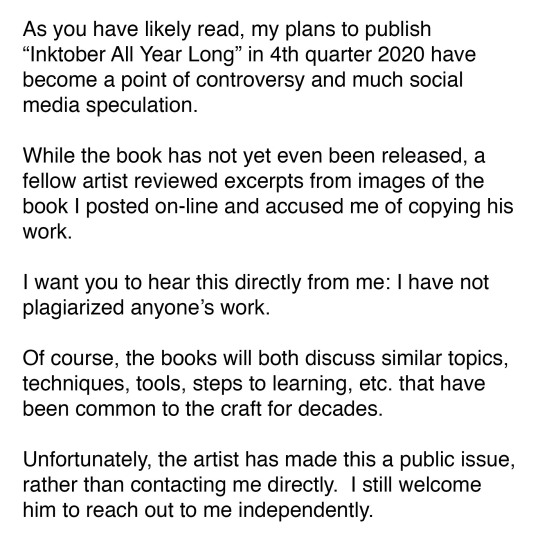
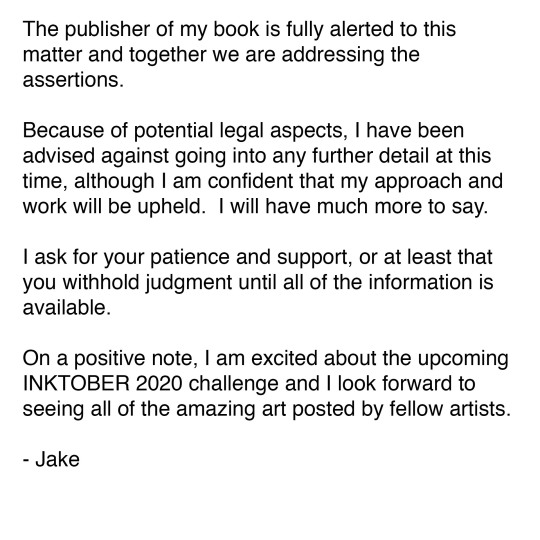
People are, understandably, outraged after seeing it. This seems like a shitty thing to rip-off Dunn - not to mention stupid. Since Dunn is the more popular pen & ink artist with more social media followers and name recognition. Many have called to boycott inktober and condemn Parker. I’ll admit, I was right alongside them at first, at least for feeling outraged. The similarities are there. But if YMS’s Kimba video has taught me anything, it’s that, even if an accusation of plagiarism may be obvious at a cursory glance, sometimes it’s important to take a more critical eye and do more research to learn that things aren’t as cut and dry as they first seem. If there’s a lesson I can take away from the internet as a whole, it’s that no one thinks about the consequences of mob mentality.
The most common defence of Parker is that because they’re both books about pen and ink drawing, then they’re inevitably going to be similar. I’ll admit that, when you pick-up so many art books, a lot of them will cover the same basic grounds of materials, tutorials, strokes, techniques etc. The parts about rendering textures on spheres and cubes isnt new. Look up “texture study” and you’ll see so many examples of artists rendering these kinds of things digitally. I’ve also noticed a common theme of people more formally educated in art pointing out how none of these are original. Everything down to the steps and illustrations are things they’ve learned from years ago. Since I'm a pen & ink artist, inspired by my love of comics, I have quite a few books about inking: Dunn’s included. I own both his books and still highly recommend them. I didn't even preorder Parker’s book. Ironically because I didn't think it could offer anything new that my other books hadn’t already.
While Ethan Becker took the time to cross-examine Dunn and Parker’s books with several others, there weren’t many of the ones I actually owned. So I looked to my shelves to see what I could find. Books like:
“The Art of Comic Book Inking” by Gary Martin & Steve Rude
“How Comics Work” by Dave Gibbons & Tim Pilcher
“The DC Comics guide to Inking Comics” by Klaus Janson
“Making Comics” by Scott McCloud
“Stan Lee’s How to Draw Comics”
I’m sure there’s plenty more examples out there. I was planning to go through all of these and take pictures. But ultimately that’s not the core point of these post. Plus it would’ve taken WAY too long and this post itself, is long enough.
Of course, none of the them are 100% close to Dunn’s in the way they’re displayed. Not as close as Parker’s could be considered. That being said, I know Dunn is trying to claim that he invented these techniques. The nucleus of the issue is how similar they are in terms of order and how these pages are displayed. Some I can chock-up to standard practice, while others seem more coincidental.
If there’s one thing I’m adamant about, it’s that I think that Dunn should’ve messaged Parker first before making the accusation public. Some try to dispute that this would've made it easier for Dunn to be “silenced”, whatever that means; but that sounds a bit conspiratorial to me. Ideally, you confront him about it in private, if he makes any threats or blows you off, get your lawyer on the phone and then make the video. Not only is it the more civil thing to do - but it’s the smarter thing to do. This is a serious legal matter, not just internet drama. While I’m sure Dunn had no intention of tearing Parker down or getting a mob onto him, that’s unfortunately what’s happened. A backlash both from the general artisan community and several companies. Wherein it was left to Parker himself to make this an official legal matter. If Parker’s found not guilty, then this could easily leave the gate open for him to sue Dunn for damages, loss of revenue, defamation of character or whatever else, should he see fit. As could the publishers, given how this affected their sales. Companies responded to the accusation of the video alone, before an investigation could be launched. Sure, it wouldn't be “acting the bigger man” but he’d be well within his right to do it. Dunn showed that Jake has mentioned him before, shown admiration for his career and referenced him in other posts. If it comes to light in court, that Dunn is even cited as an inspiration or source in the book itself, then it’s case closed.
Then there’s the other possibility that Parker might not have done this on his own, but that he has a team behind the book. If that’s the case, the most I can accuse Parker of is being a hack. I worry Dunn has kneecapped himself for just how badly he’s handled this situation. Made worse by him not having an actual physical copy to assess and just had footage of preview pages to go on. So far, the circumstances don’t seem on his favour.
I don’t think ill of Dunn. I do think he believes he’s been wronged and no malice in his intentions. I just think he’s made some critical errors on how to handled this. As for Parker himself, I couldn't give a donkey’s doo-dah about him. I’m sure you could accuse me of playing devil’s advocate earlier, but to me, he was the guy who released the annual prompt list. If it really does turn out that he’s a plagiarist and had malicious intent, then fuck ‘im. I never regarded him as an inspiration of mine or paid much attention to him outside of that. It was the community that made Inktober what it is. I’ve never met Parker. Maybe he’s a cool guy? Maybe he’s a bellend? I don’t know.
Granted this isn't the first time Parker has proved himself to be a controversial figure: - Last year people were upset about him trademarking (not copywriting, as many have erroneously claimed) the word “Inktober” and some artists were stopped from selling their related work or zines. Parker would issue a statement: claiming the takedowns were a mistake of “overzealous lawyers” and it’s just a matter of the logo being trademarked. People can sell their Inktober works and even mention they are Inktober-related. Just not use the official logo. On the one hand, from a business standpoint, I get it. It’s the bare minimum you need to do to protect your IP, especially when you have a store. BUT, like most people, I don’t like how, what’s intended as a community challenge, has slowly become more of a brand associated with one man. Hardly a surprise it left a bad taste in so many people’s mouths. But, since it doesn't actually effect anyone’s ability to take part in the challenge, outside of personal principle, I went ahead with it the previous year.
- The year before, when asked if one can do Inktober digitally, Parker said the following:
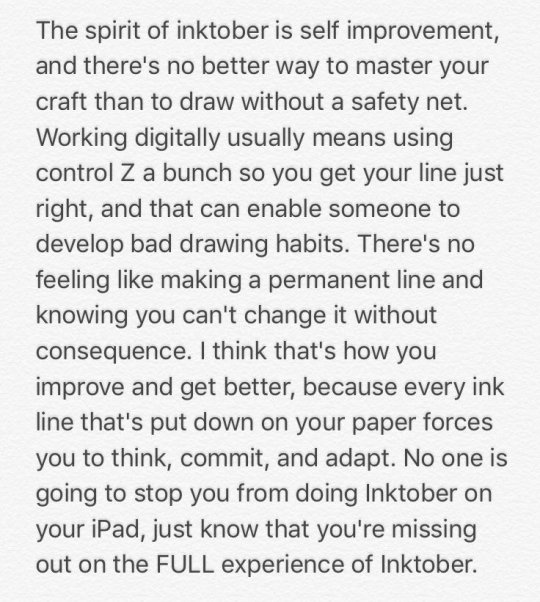
I know some are still bitter about that, but speaking as someone who inks traditionally and digitally, this came across as needless whinging and blowing things out of proportion. Claiming that Jake had derided digital artists and said they were invalid etc etc. Take it from me, challenging yourself to try out different methods to ink traditionally can greatly improve the work you do digitally. It’s like how learning traditional fundamentals of art can still be applied to digital. Plus he never said “No.” he just gave valid reasons about how it makes it a different experience. That said, if you’re someone who can’t afford any kind of inking equipment or pens and only have a selected application to draw on - then none of this applies to you. Just the aforementioned few who took it upon themselves to get angry over nothing. Recently I’ve heard from subscribers of his newsletter that he’s now embraced the idea of people doing inktober digitally, to the point of selling digital brushes for inktober. I’m sure some will call this “backsliding” or “money grubbing” because people aren’t allowed to change their minds or update their statements.

For weeks I’ve been torn on what to do, not being able to solidify one stance over another. One minute I thought #JusticeForAlphonsoDunn then I wonder “Wait maybe I should look again?” to “But wait, those are way too similar!” Having splinters in my arse from sitting on the fence for so long. The longer this went on, however, I began to realise that I can’t take one stance over another. This case is far too muddy and complicated. I don’t have enough sufficient knowledge or evidence. Nor do any of you. We literally only have Dunn’s video to go on. While it’s a good start, it’s not enough to be taken 100% as gospel when it’s the only thing to hand.
As previously mentioned, a lot of artists have decided to not take part in Inktober at all, or follow different prompt lists. That’s completely fine. A lot of them are based around a specific theme: halloween, kinky stuff, bears, transformers, OCs, Disney or whatever. That has massive appeal. I just can’d do it myself. I prefer the focus on random words, rather than all centred on a single subject; allowing me to be creative with my ideas and execution. I actually did try to make a list of my own random words. Problem is, I worried that because I was choosing my own, I might be subconsciously bias towards certain prompts and not truly challenging myself. Even narrowing down my options was taking too long. In the end…. I’ve decided to just do the official prompts again this year.
For me, that’s what it ultimately came down to. TIME. It’s the middle of September. I can’t afford to wait for the court case to be settled. No other prominent artists I respect have released their own prompt lists. I know there’s been some shitty people who are condemning this choice. Attacking others, accusing them of supporting plagiarism, looking to block anyone who does the official prompts. Even trying to make this a racial issue. Just…. no.
If someone doesn’t want to take part in Inktober, that’s fine. If someone wants to do the official prompts, that’s fine. If someone wants to do their own prompts, that’s fine.
Don’t go around aggressively making snap judgements or accusing people of taking a side. Do whatever makes you feel comfortable. This has been a shit year, let people enjoy something.
If you look at this situation and it makes you feel angry, and you don’t feel comfortable in taking part in a challenge because of it’s creator. I get that, I literally get that. It’s why I haven't done Mermay. And please don’t mention Pinktober, I’m aware of it, but given his insta video on the subject and the things he said, I quickly came to the conclusion that I can’t take this person seriously. I’m sure this might make me seem hypocritical, but how this differs, if only for me, is the sheer amount Inktober means to me. It’s more than a simple challenge. Inktober's the one thing I’ve been most excited about all year. As it was ruined for me in 2019, when I lost my home and I didn't get to complete every prompt. (Long story, I’m okay now). As we all know, 2020, has been an AWFUL year. We’ve got to take whatever joy we can. As I’ve looked longer at the official prompts, I found ideas I’m really excited for.
Once I started to really dedicate myself to it, it became a massive event. I hype myself up as I prepare for the busy month. Buy in supplies, clean the house and workspace, cook and freeze meals in bulk to save time, printing off a sheet that allows me to jot down ideas as I plan ahead. Then once it’s done, after so much work, it makes the reward all the sweeter: Ordering a takeaway, celebrating a great halloween night and still rocking those vibes throughout November. Feeling proud of myself for doing it and seeing myself improve my technique, discipline and earning a few lie-ins to make up for the sleep I lost working. I’m like a kid waiting for Christmas. That said, don’t think that there’s something wrong with you when you understandably can’t dedicate that amount time for a simple art challenge. If anything that’s plenty of reason to why you’re smarter than me. You have a life and don’t push yourself too much.
Now, I need to crack on with the preparations. If you want to boycott Jake Parker, just not buying any of his products should be enough. Doing the inktober challenge doesn't bring attention to him, as I doubt most people even know him as the creator, nor does it even line his pockets. I just hate how cancel culture can do such serious damage like this and then try and put pressure on others to act accordingly without even doing any research themselves.
As long as you’re not harassing anybody. Just do what YOU want to do. That’s fine.
101 notes
·
View notes